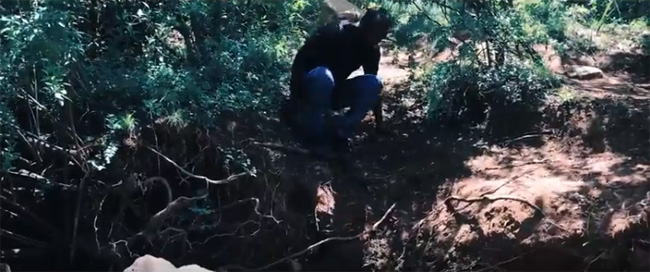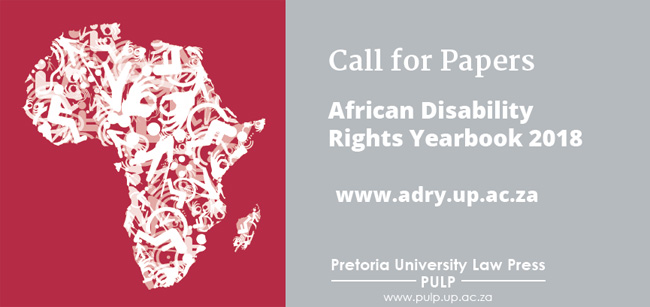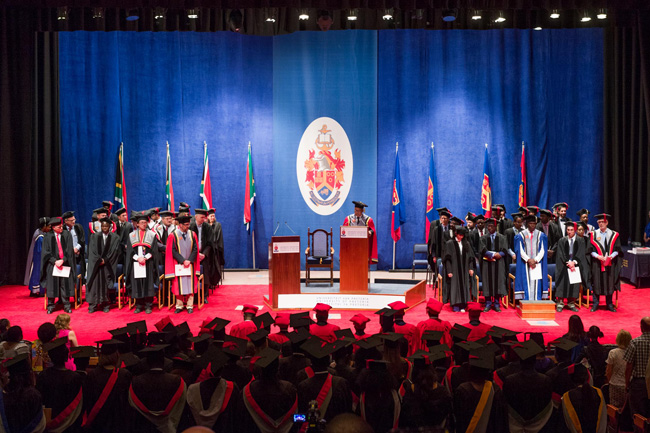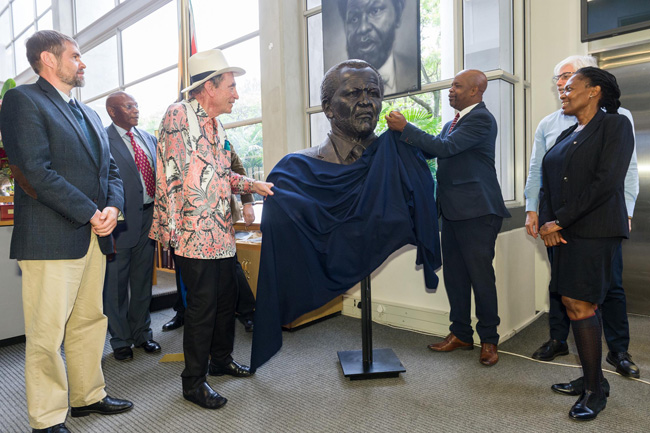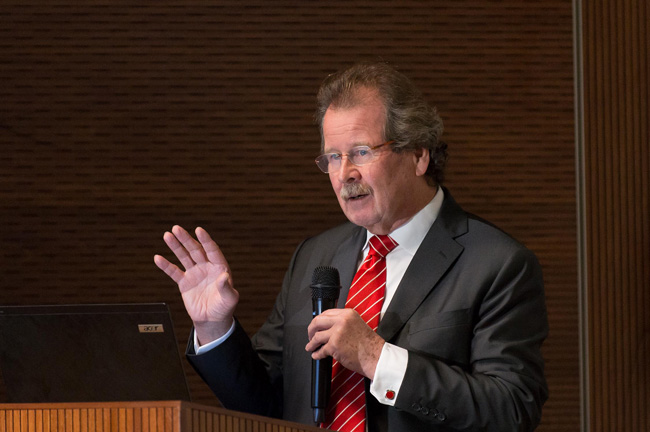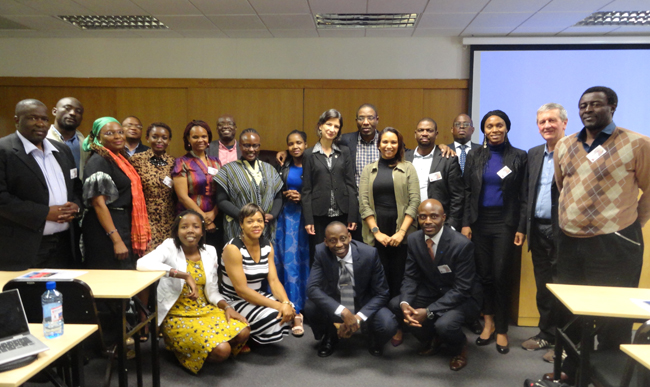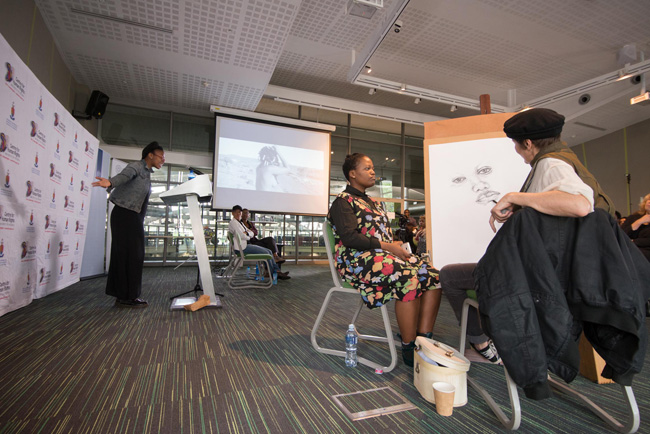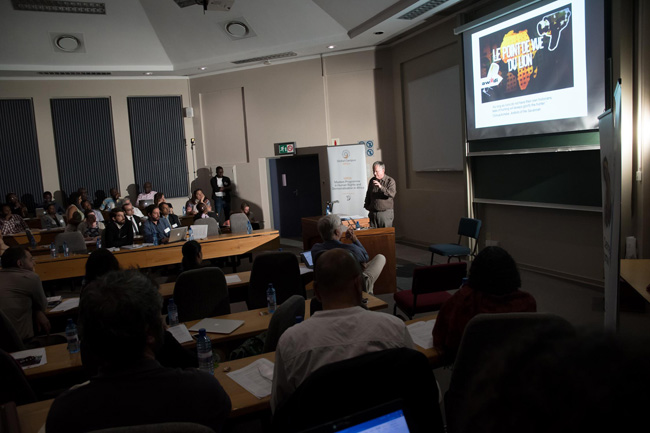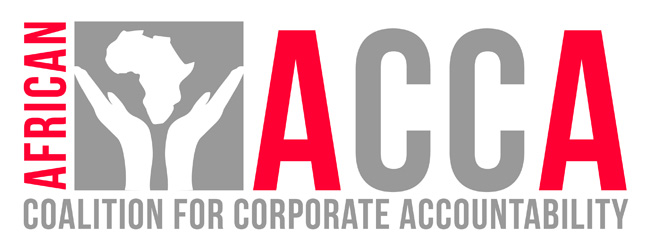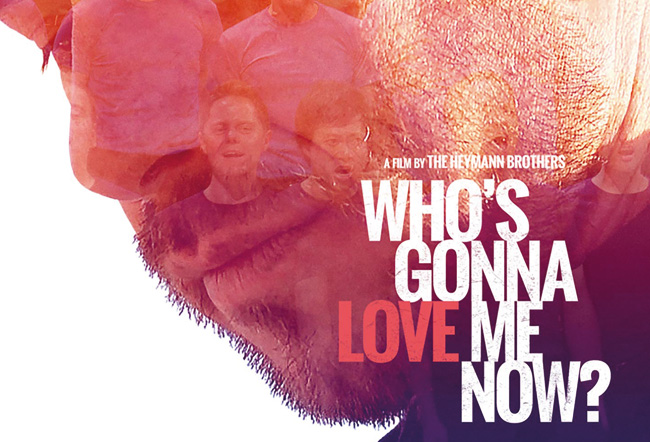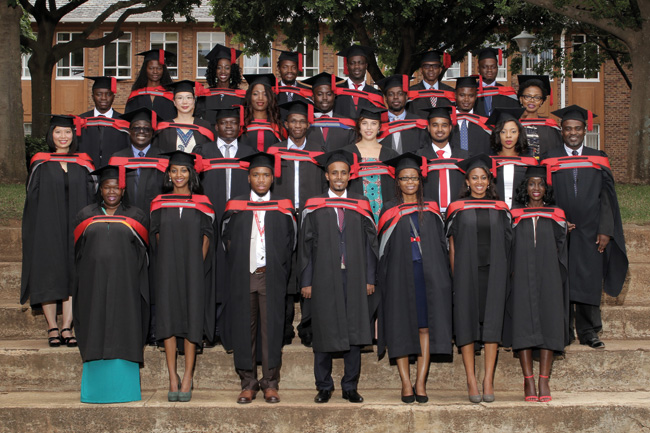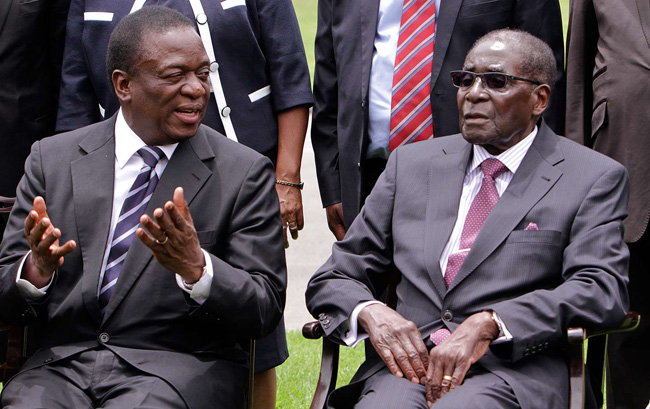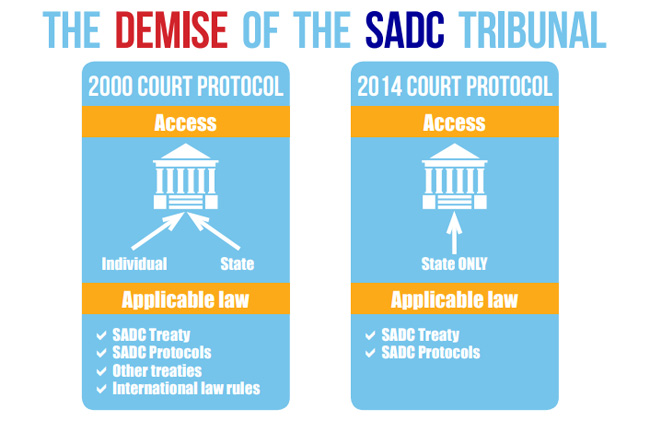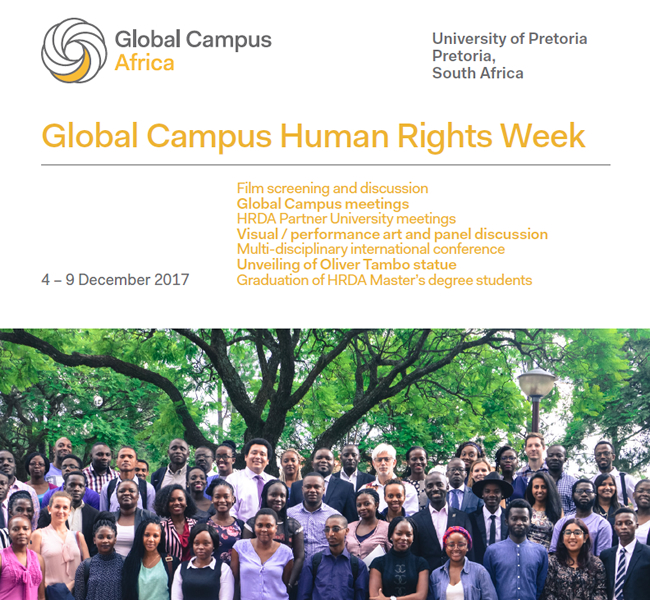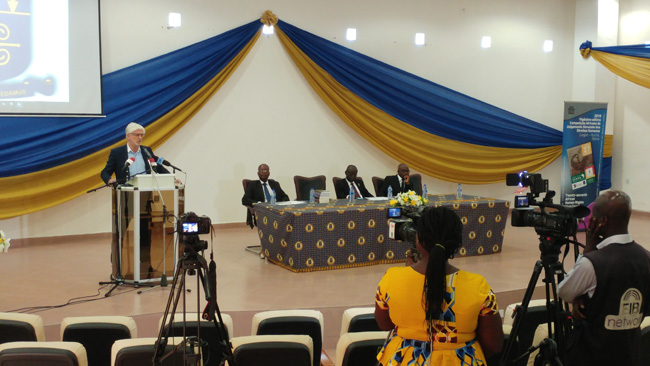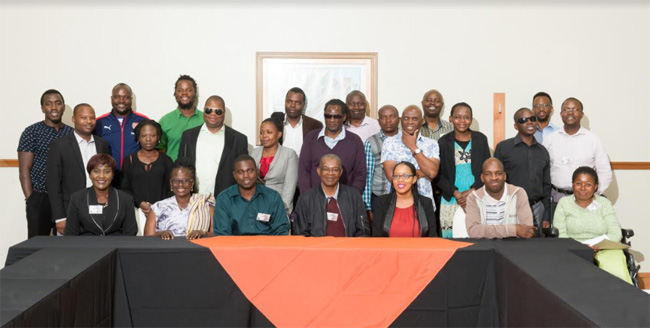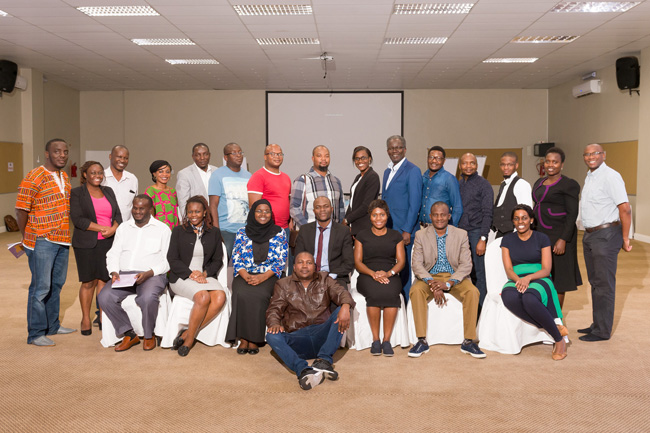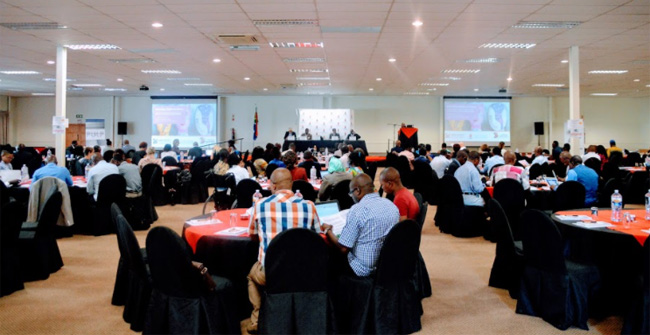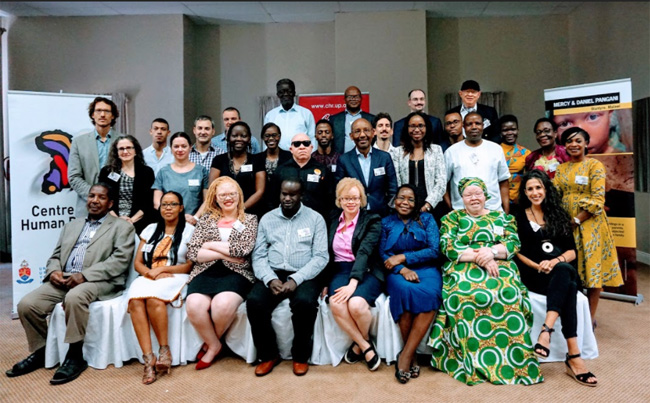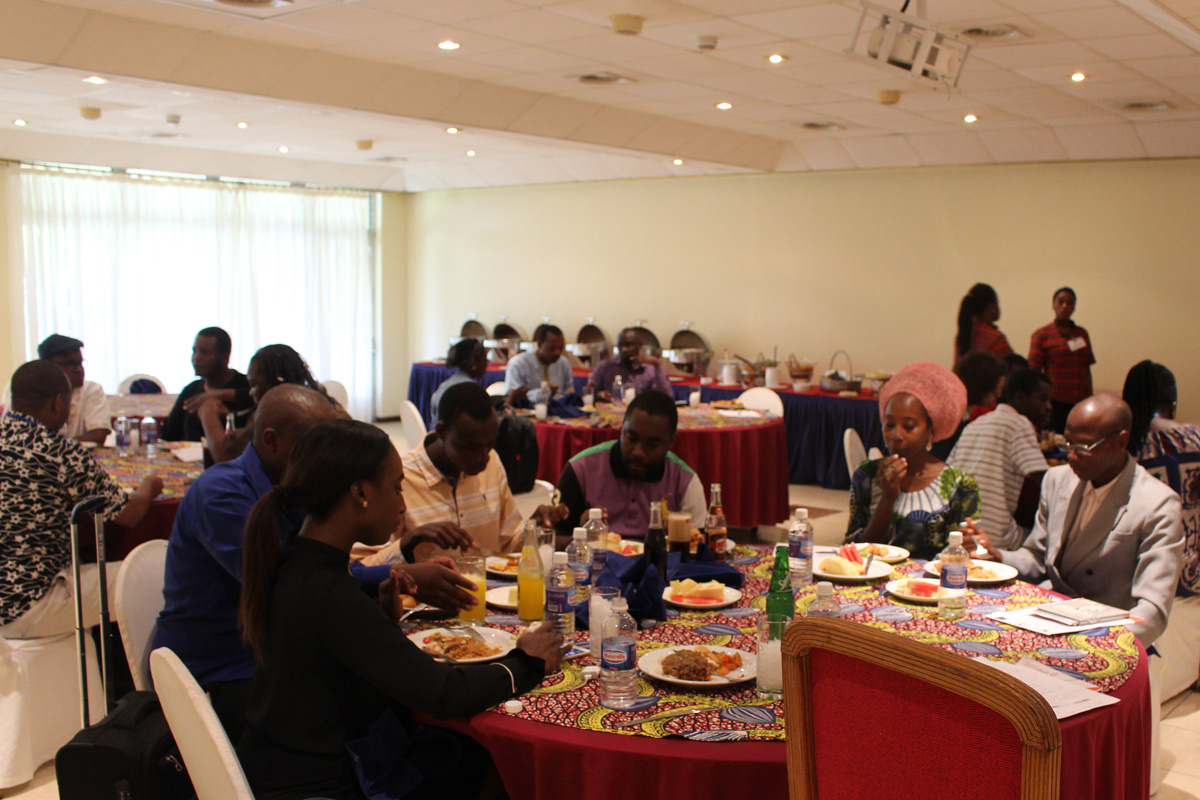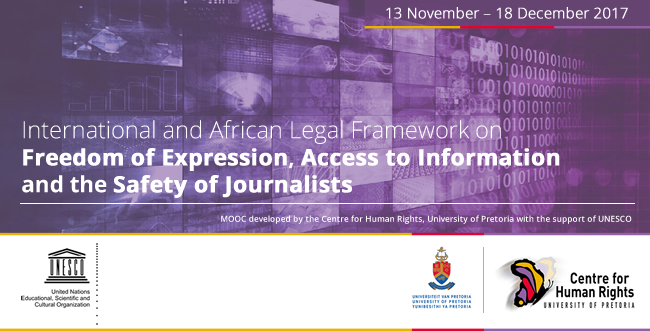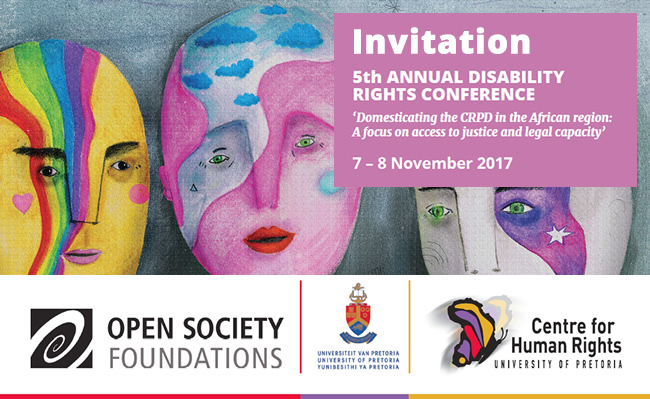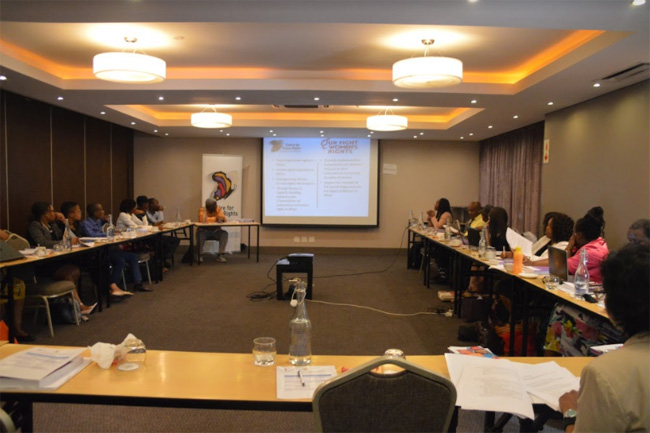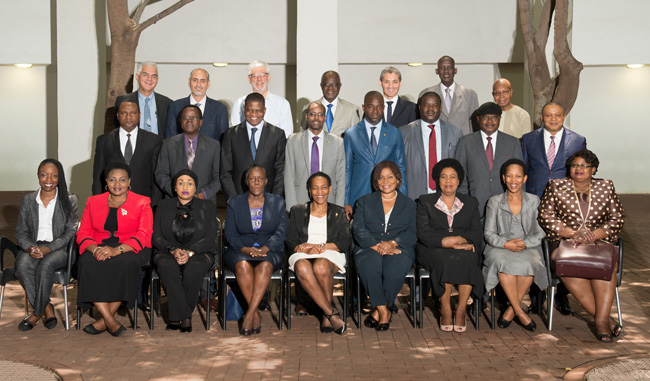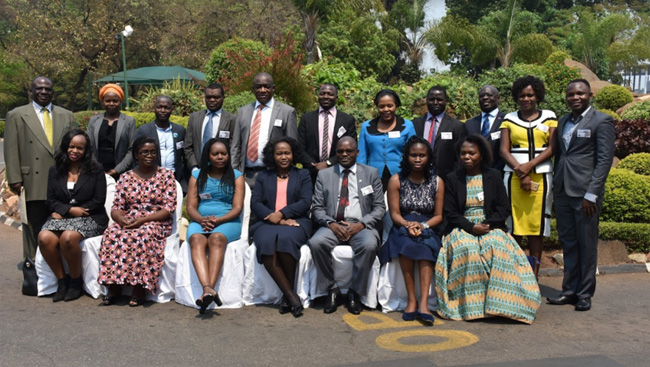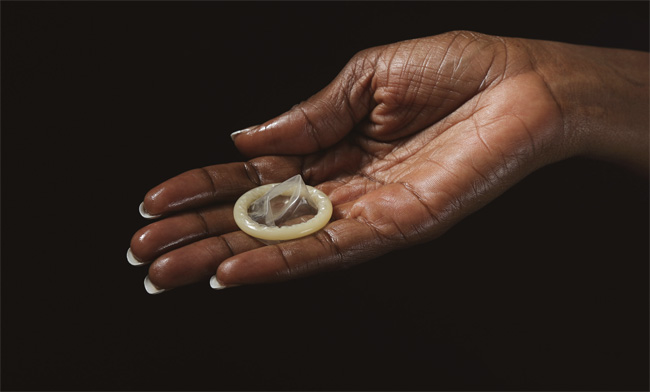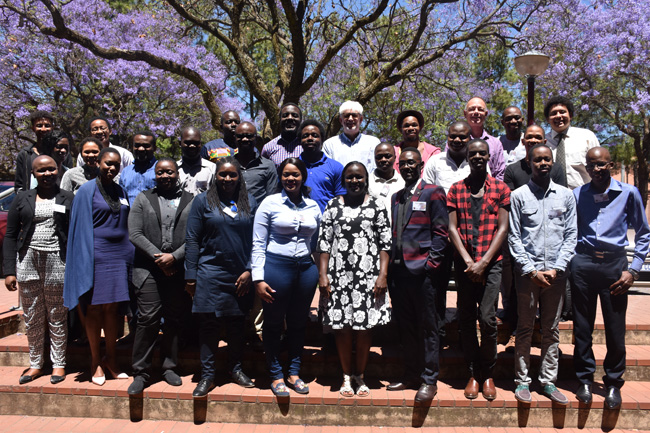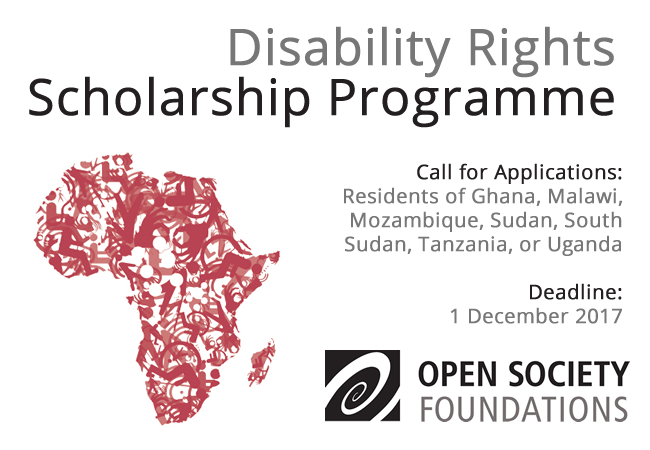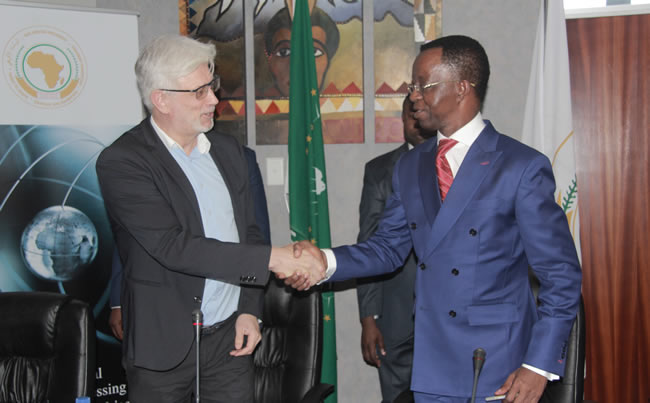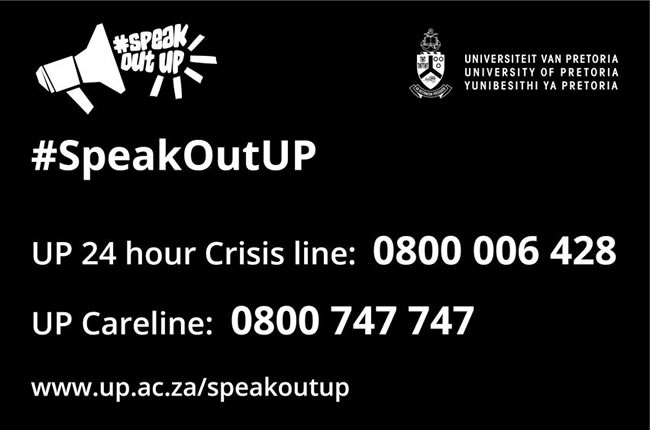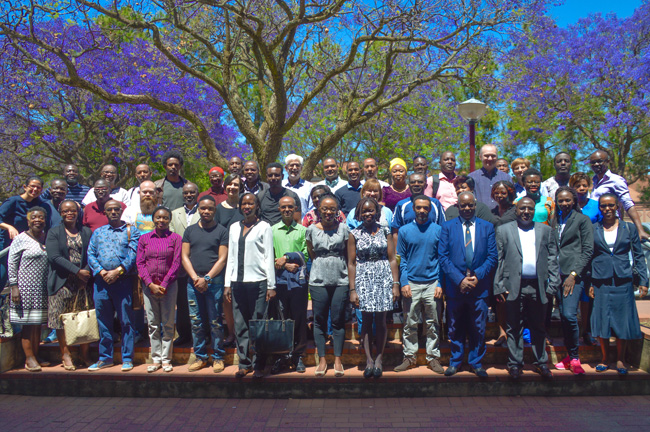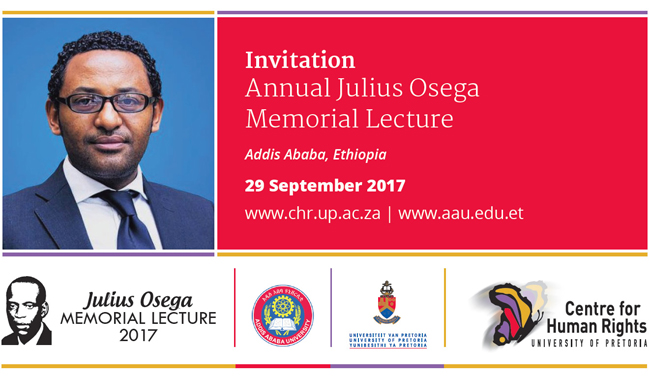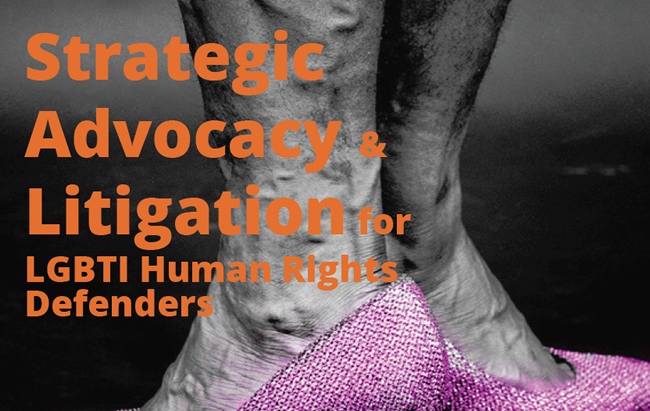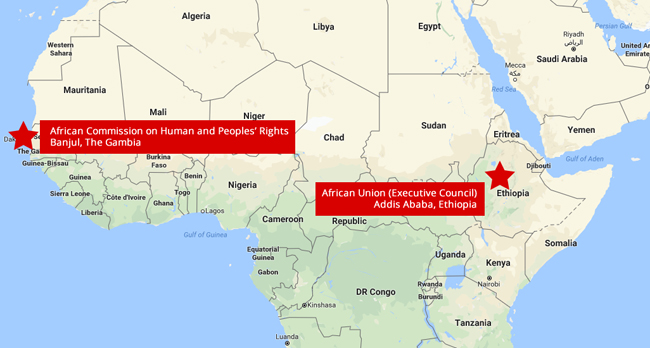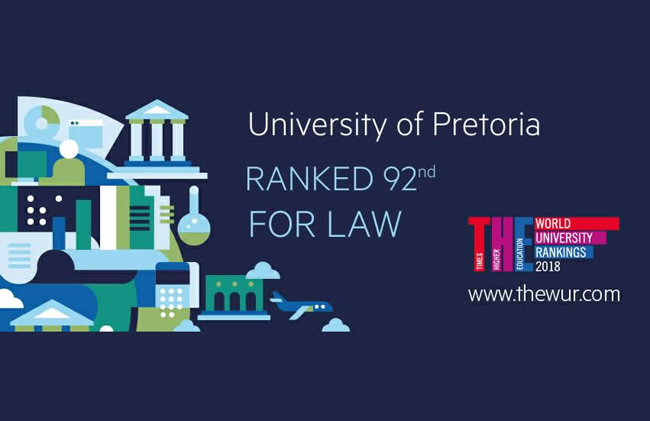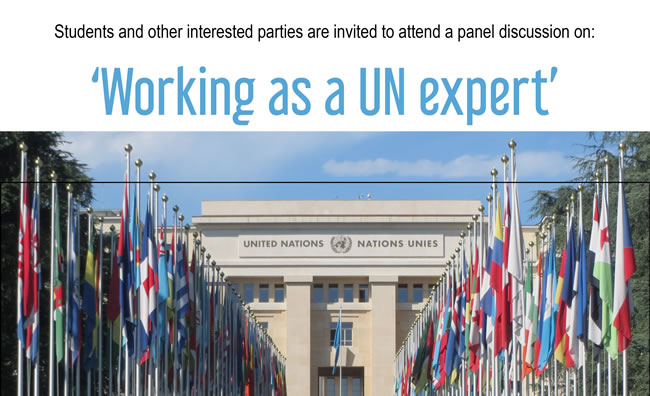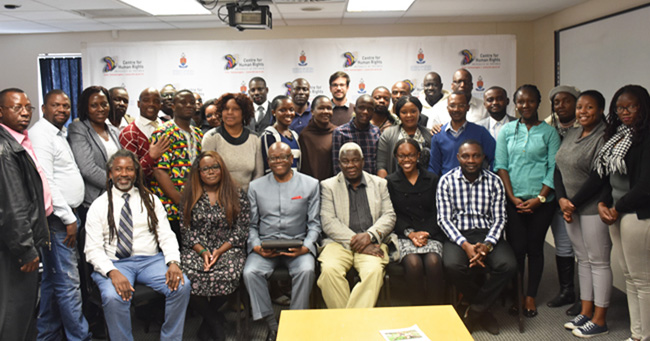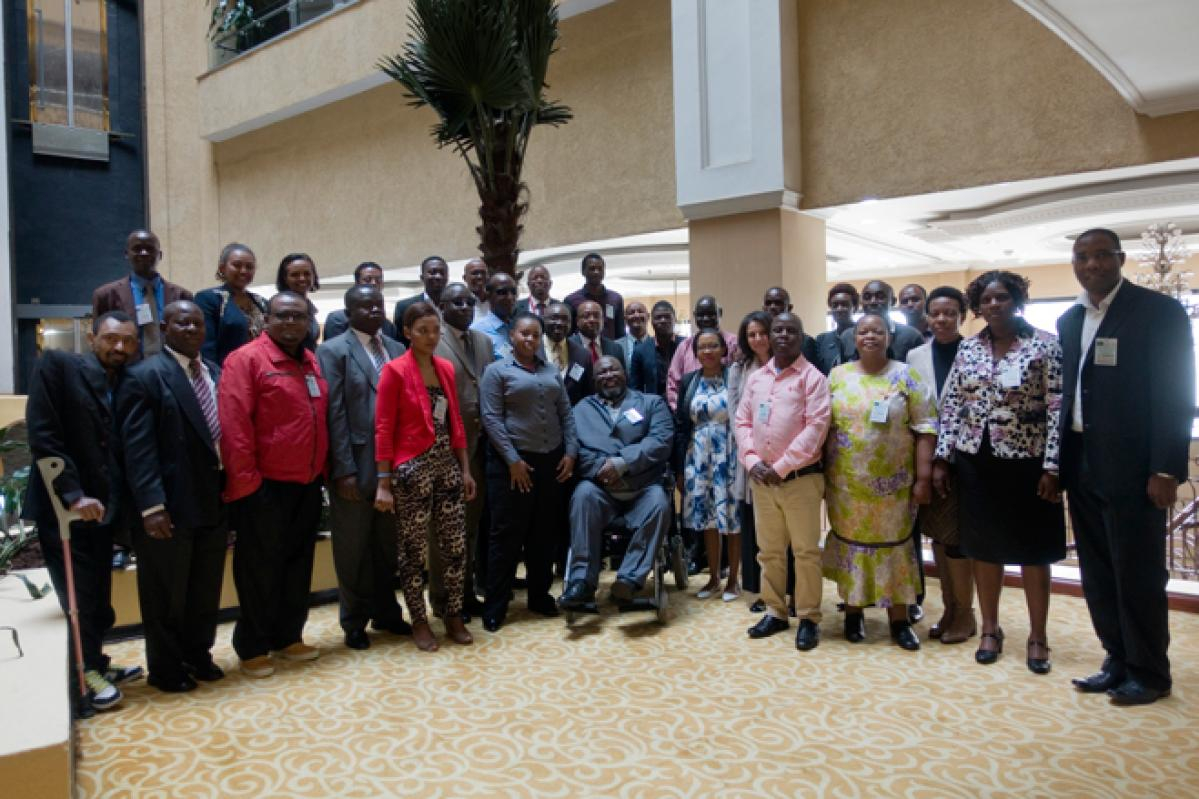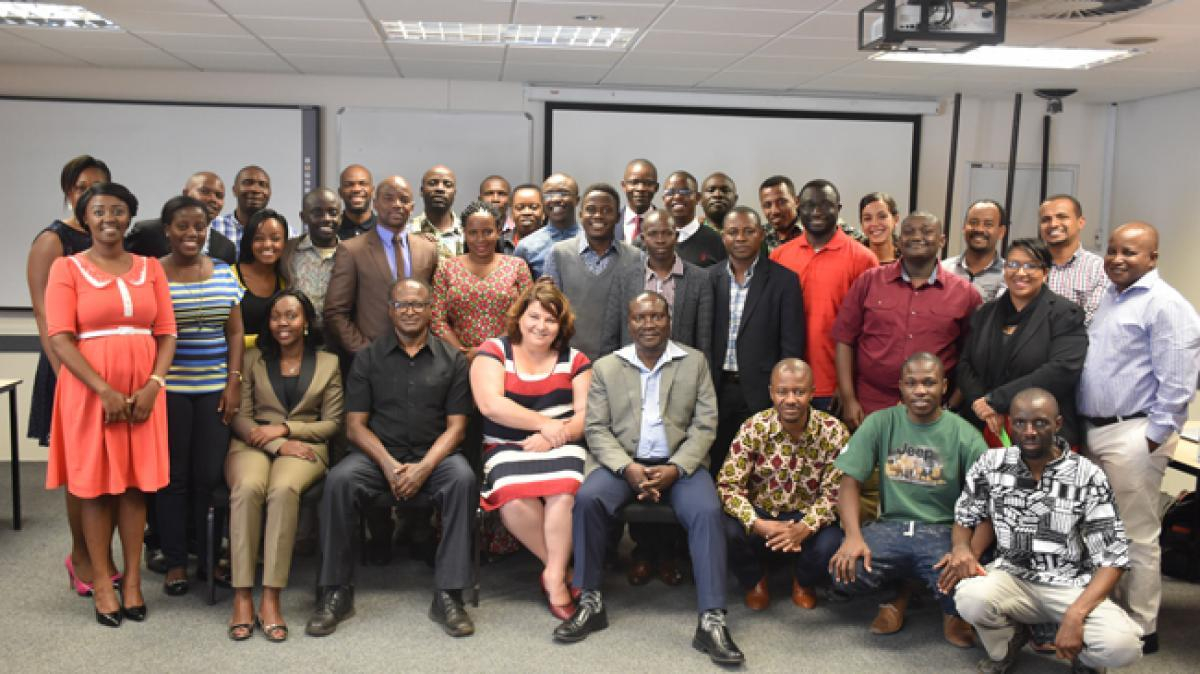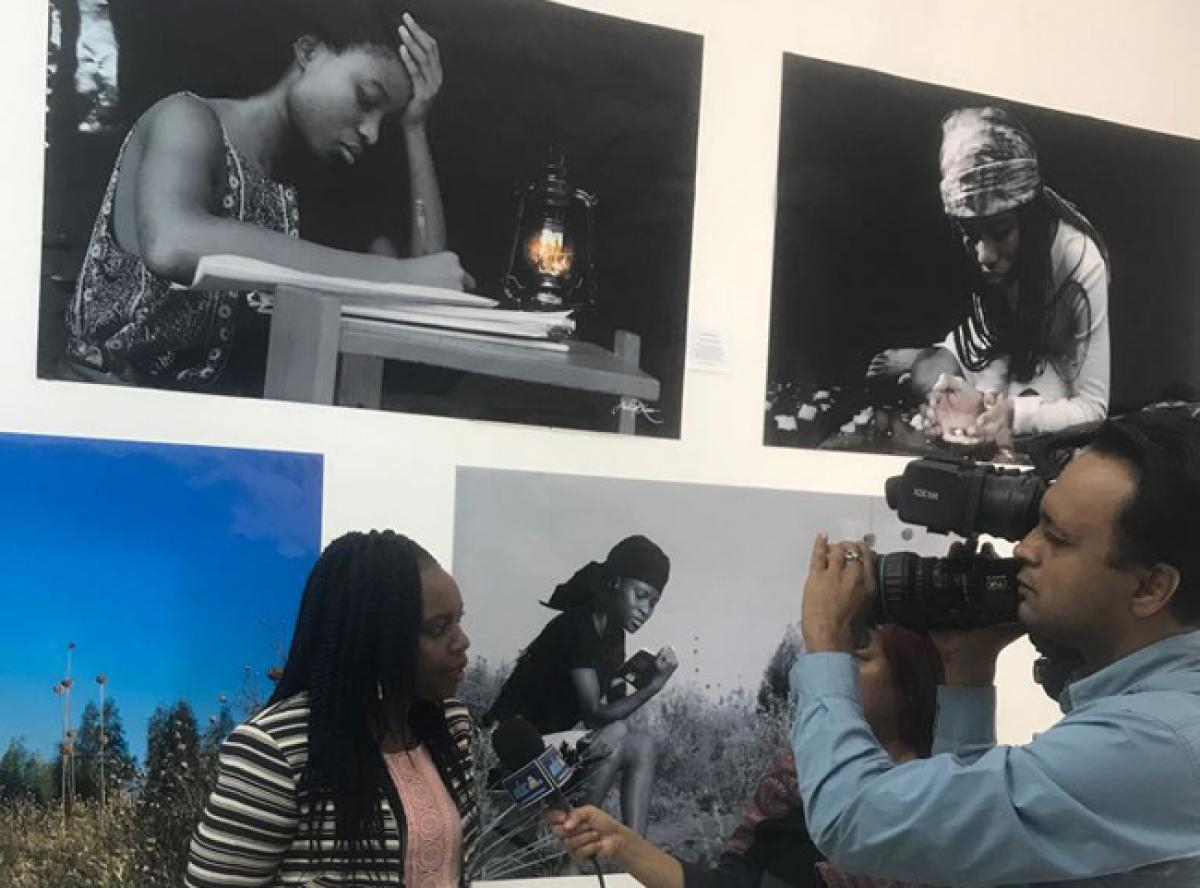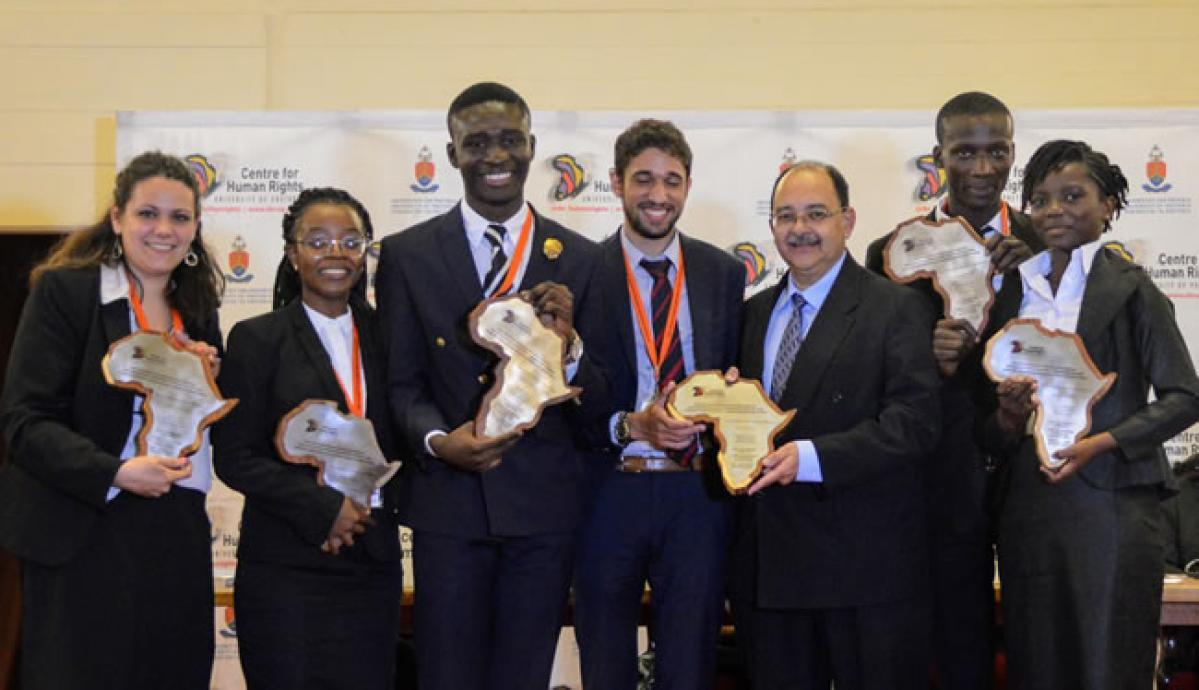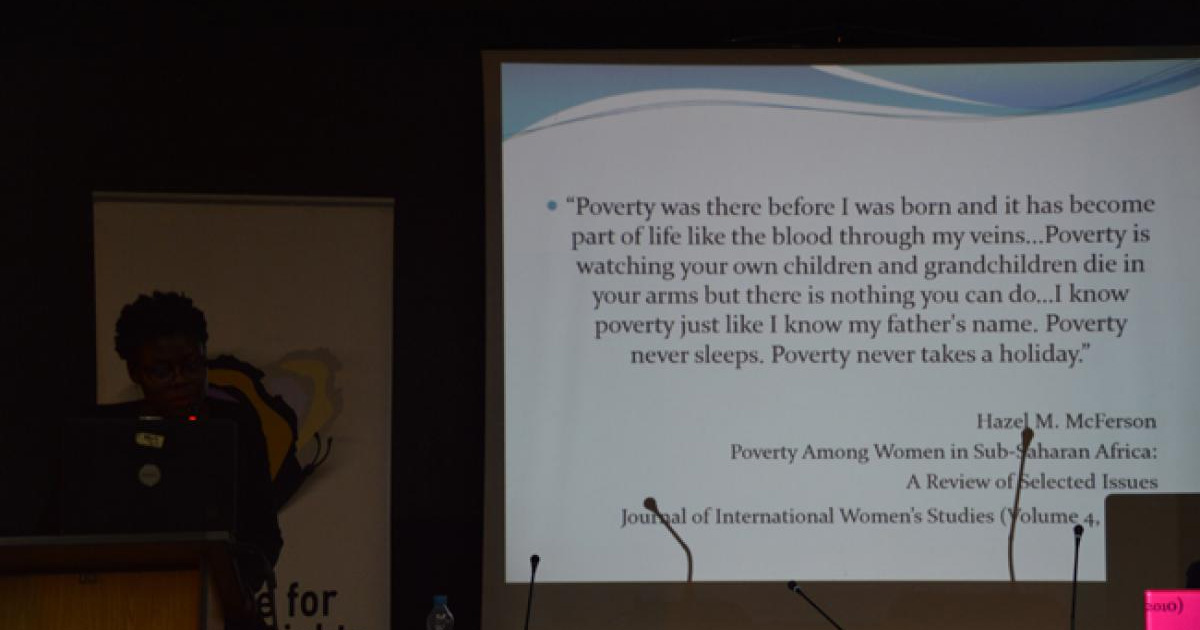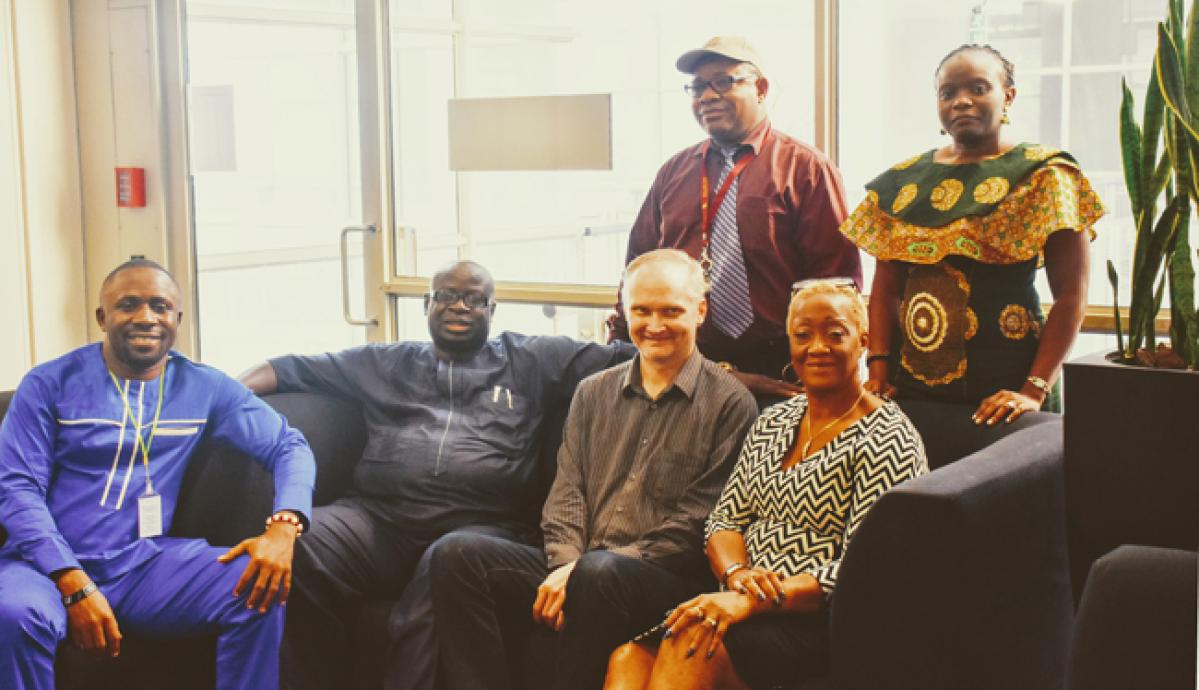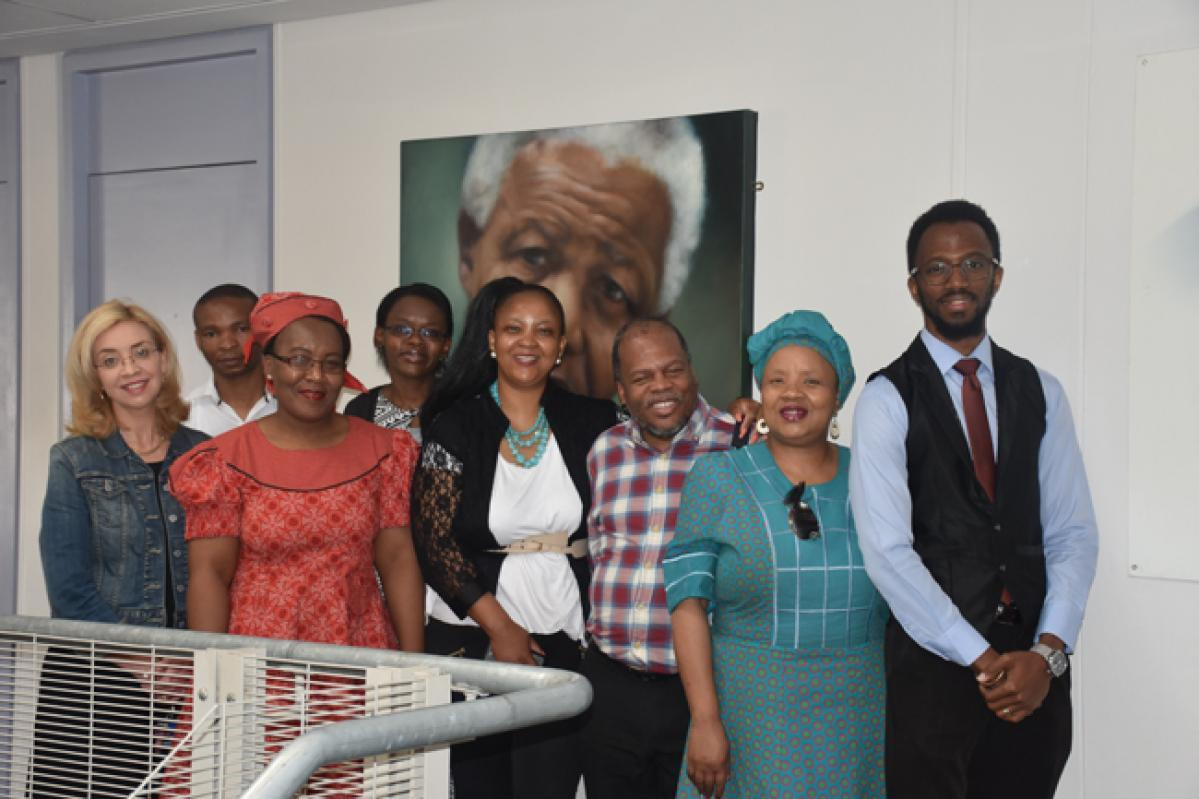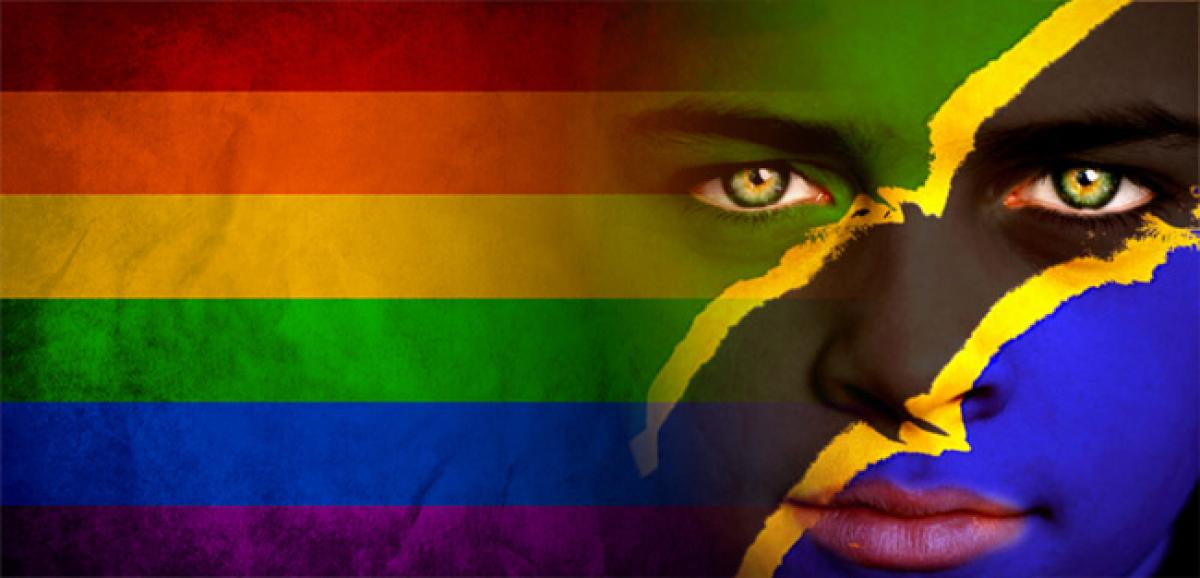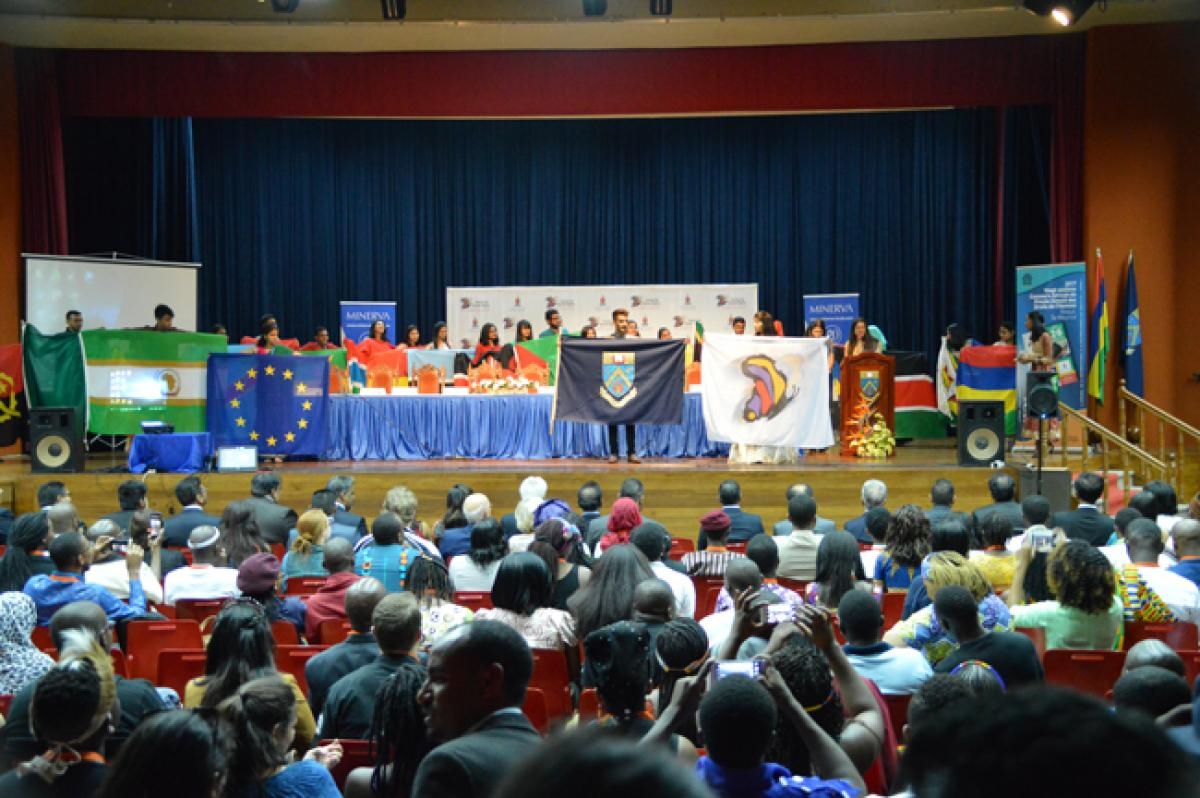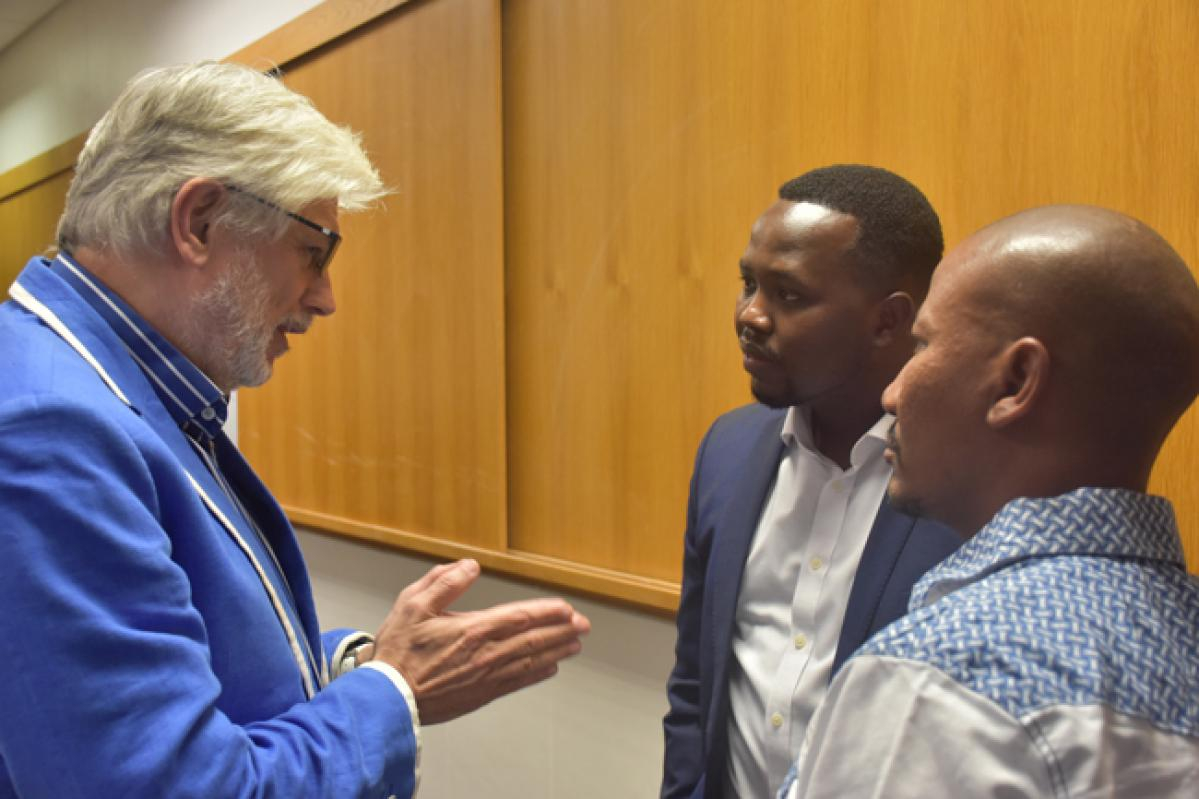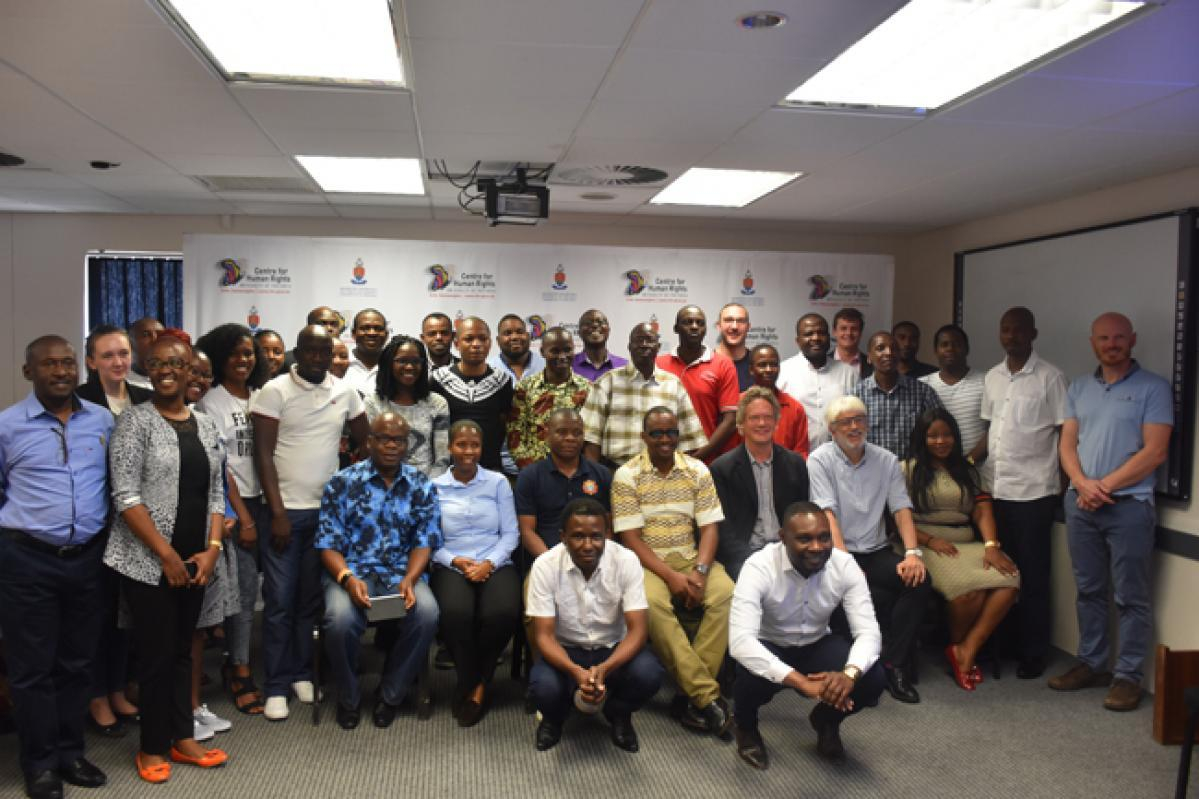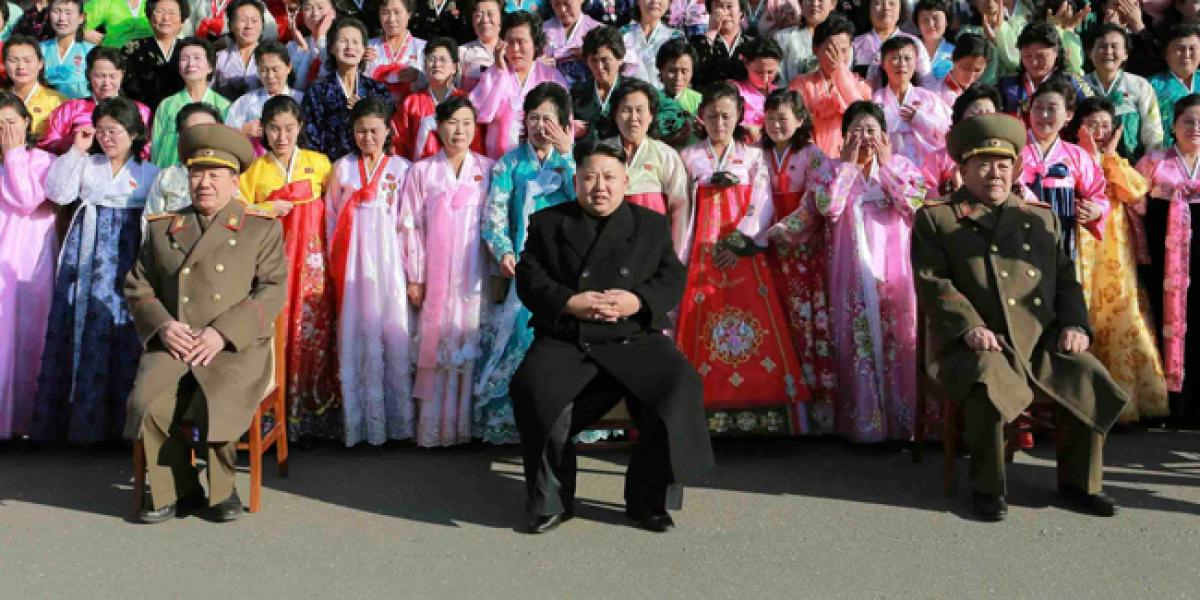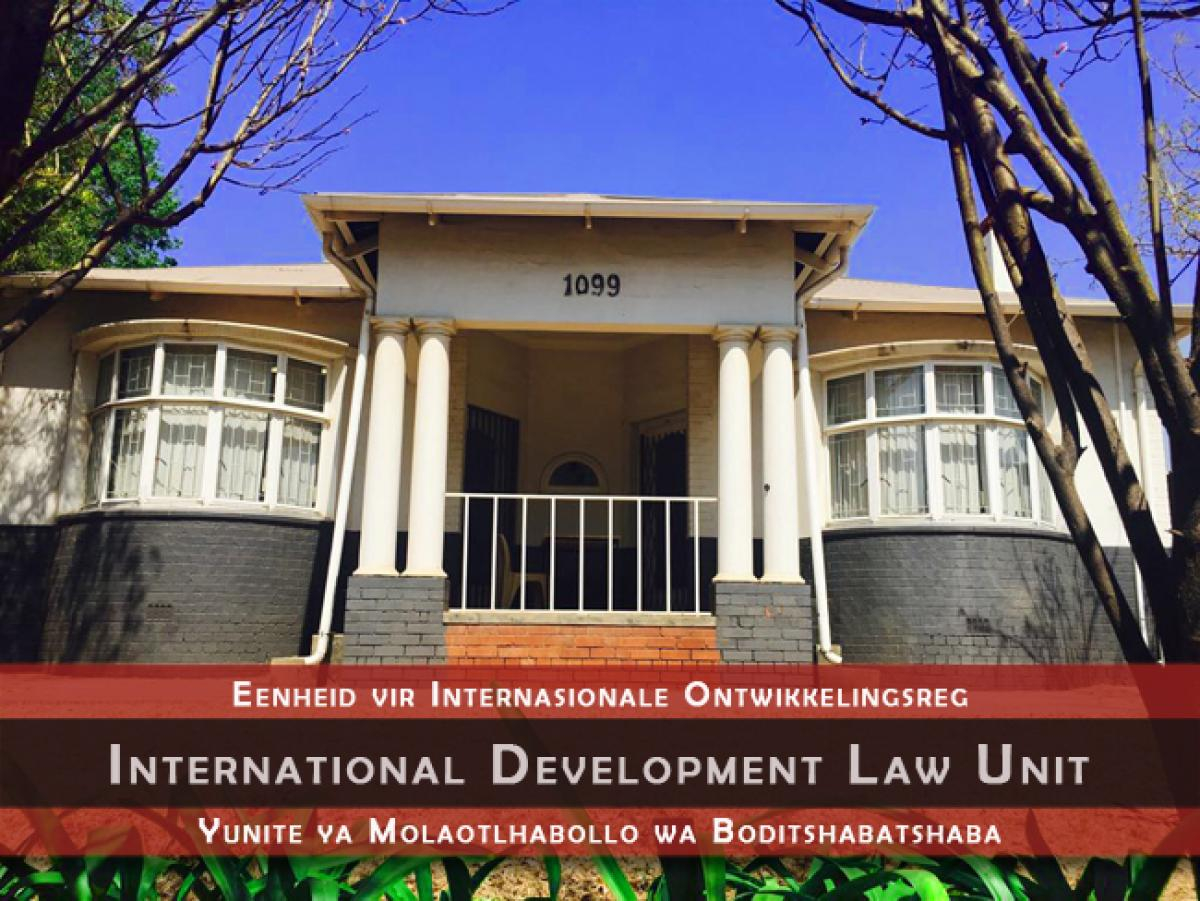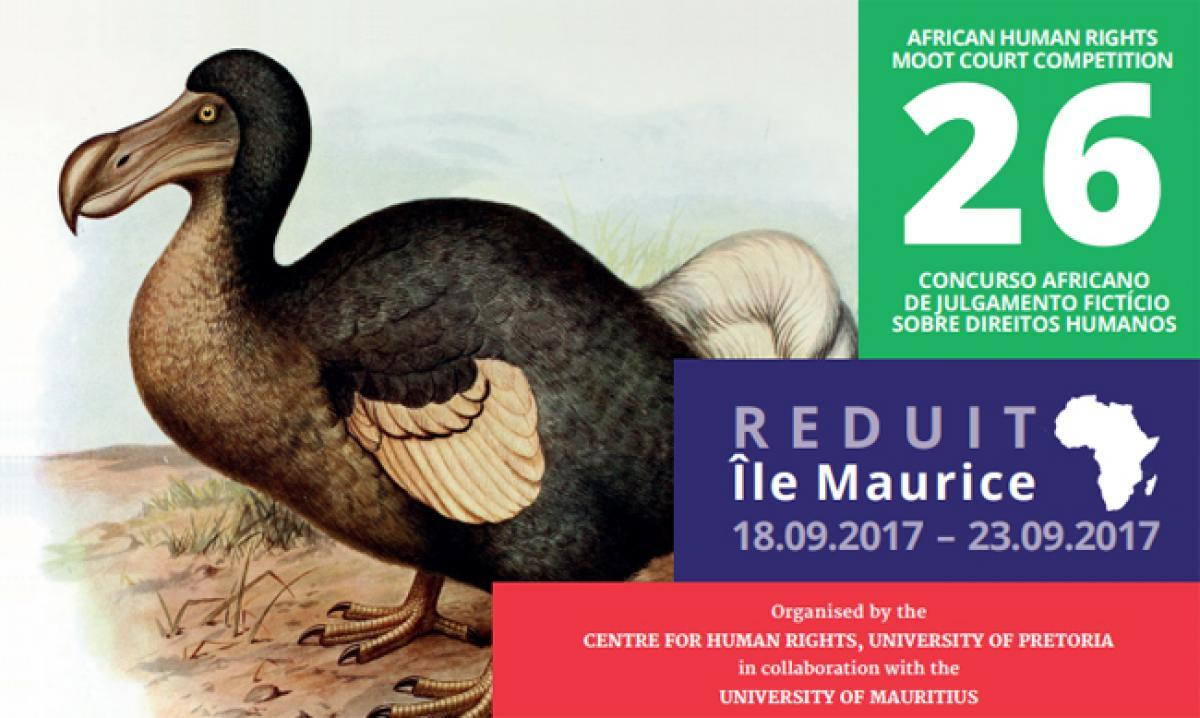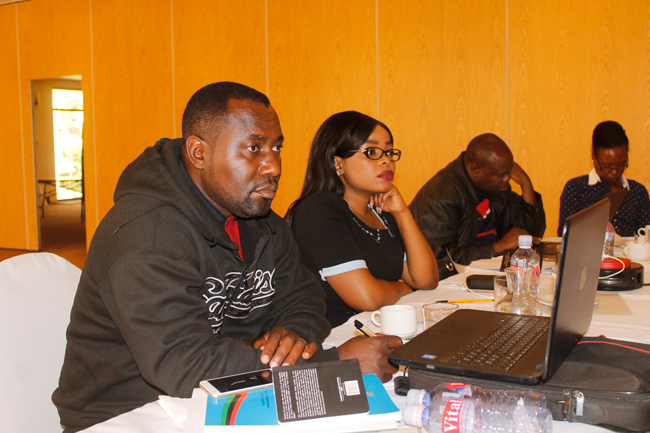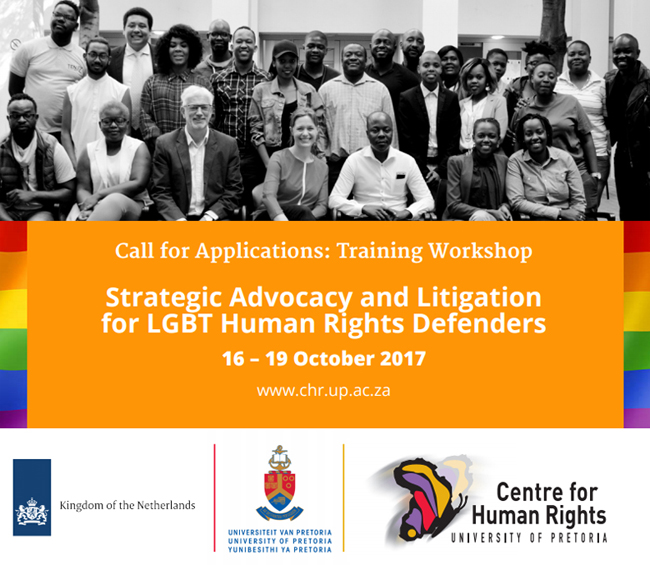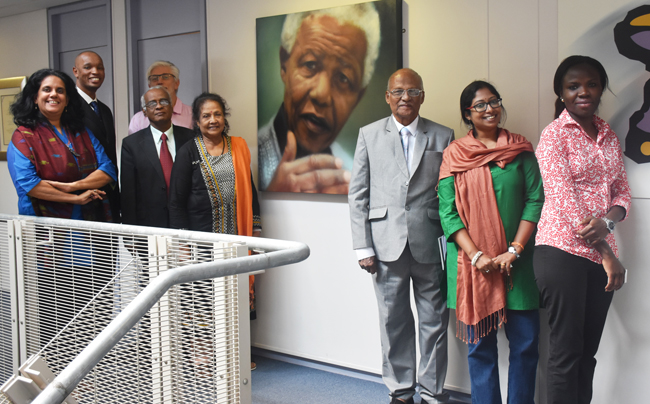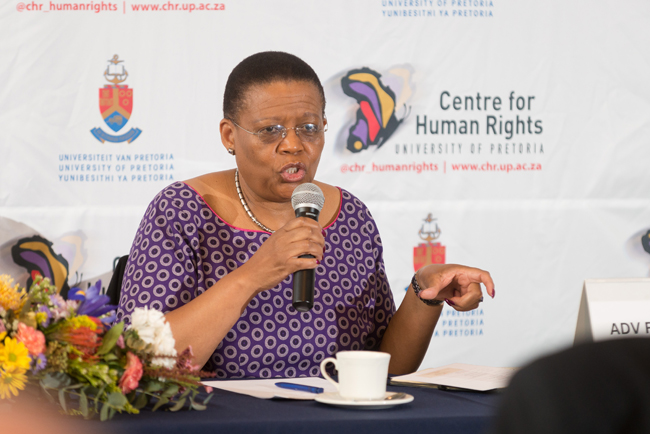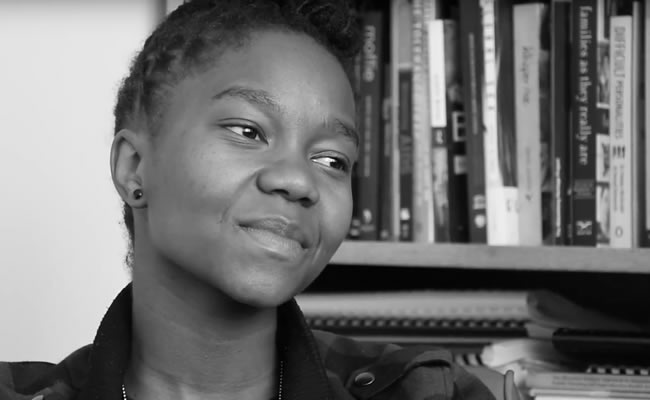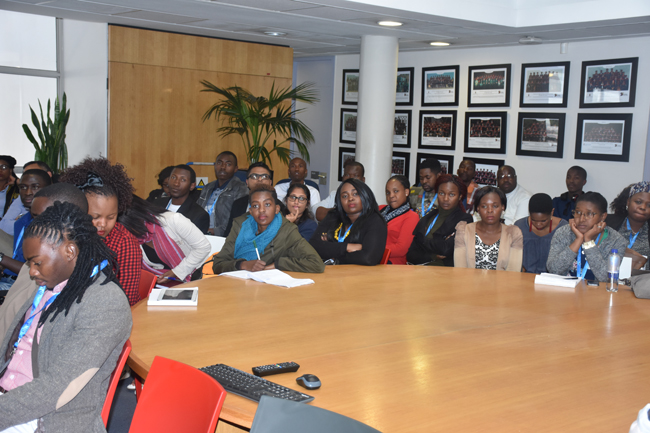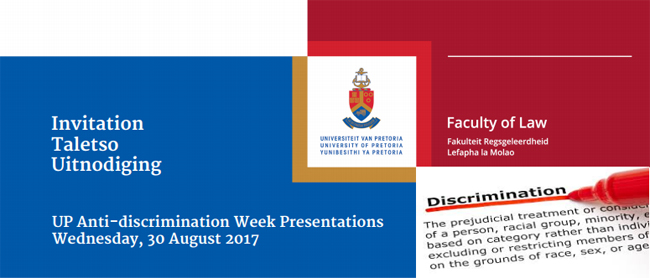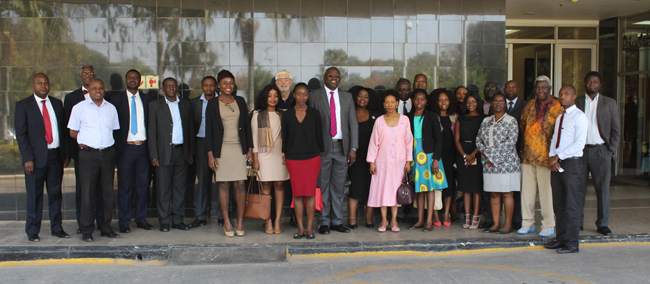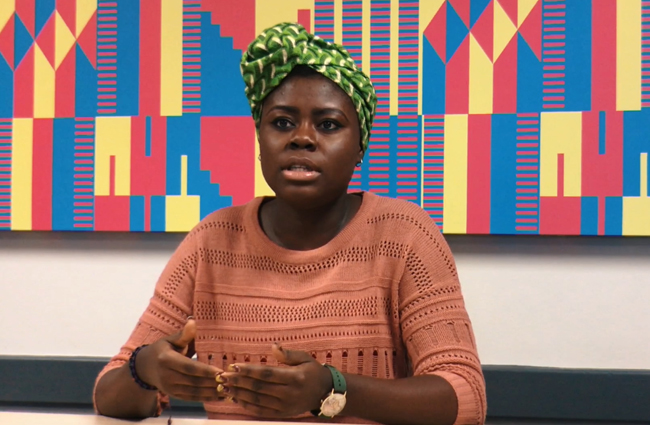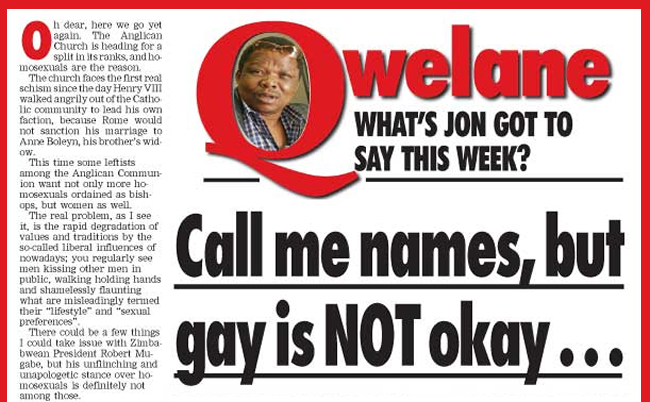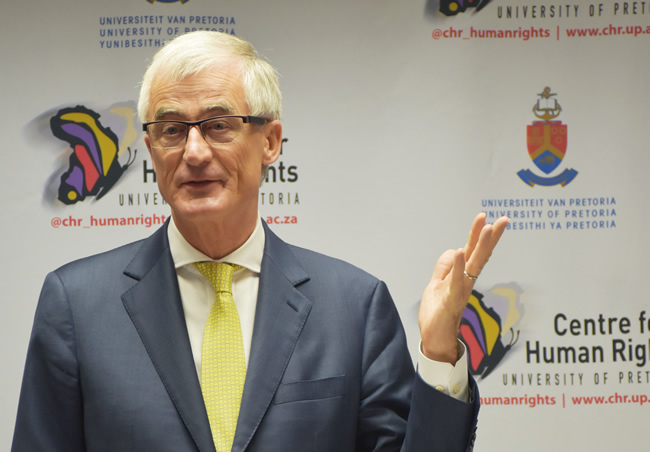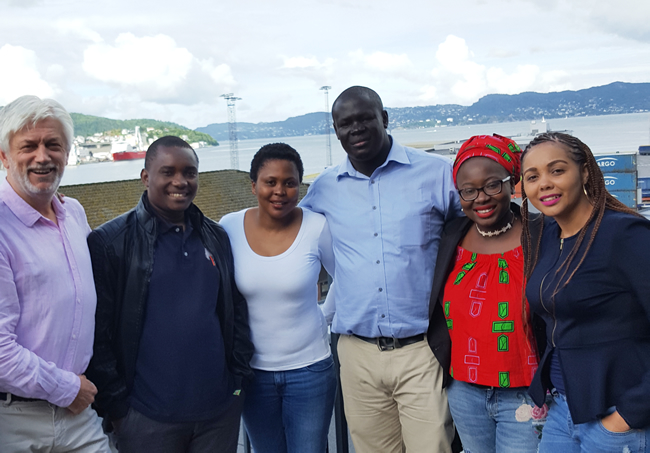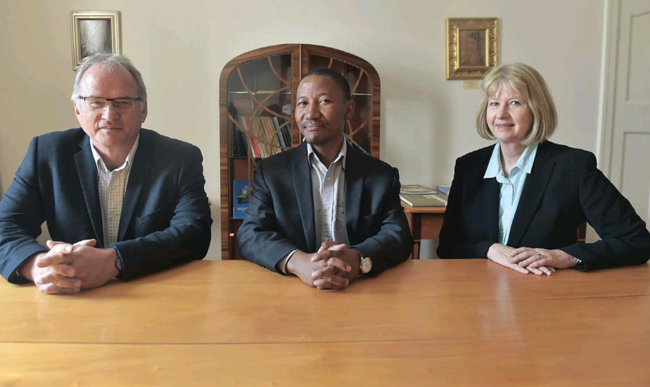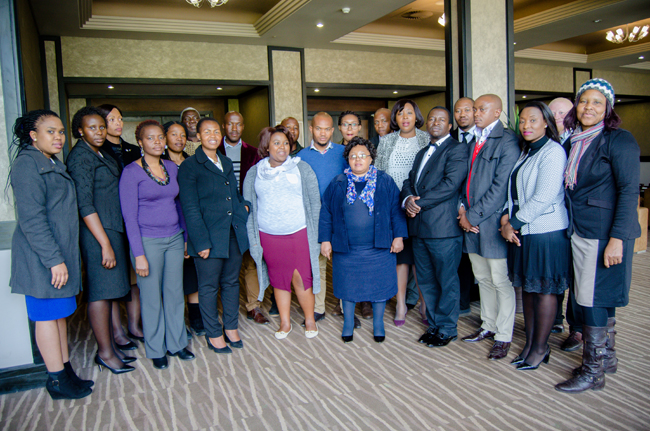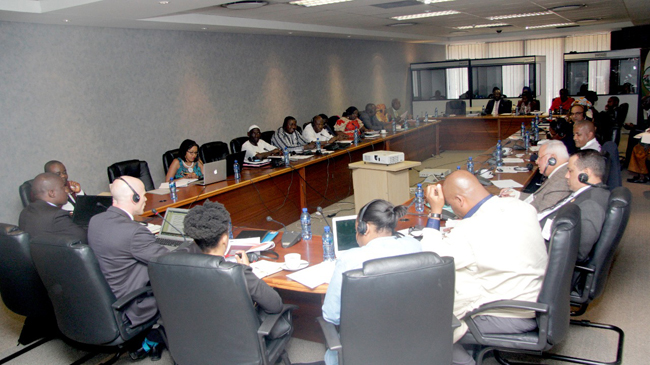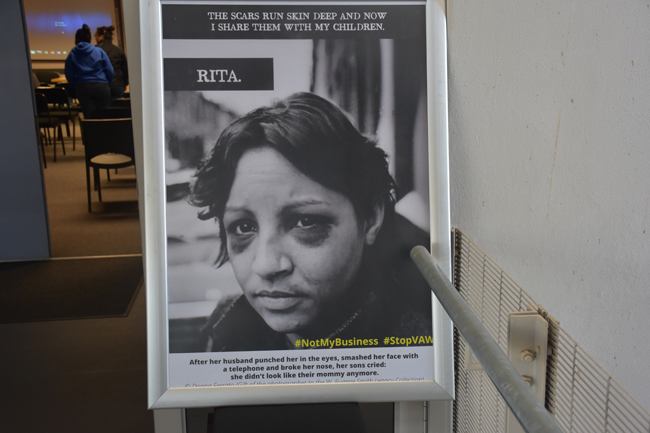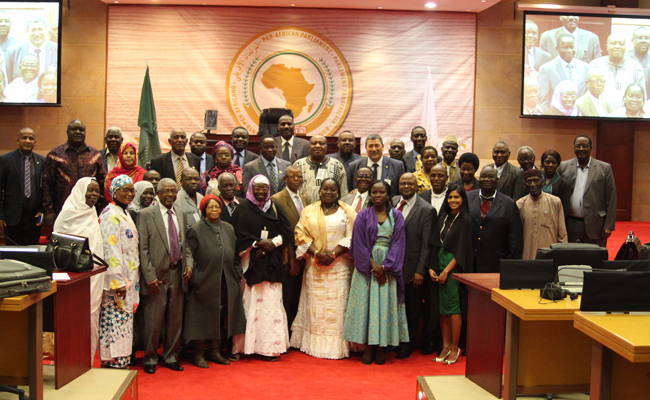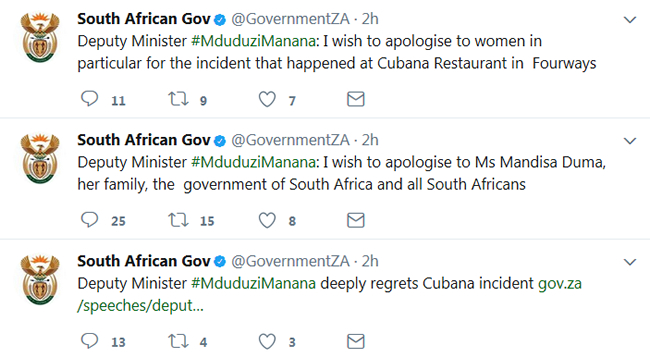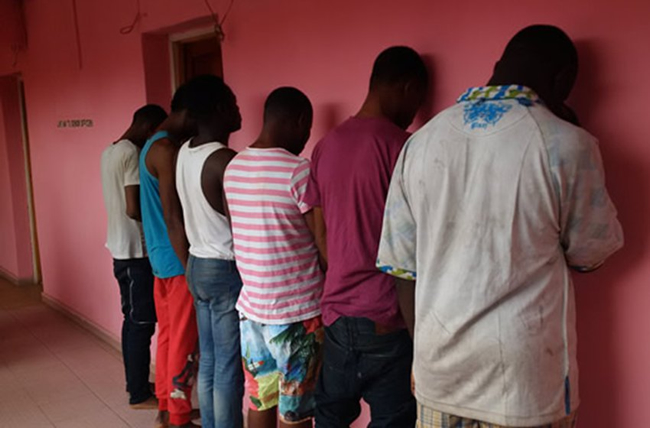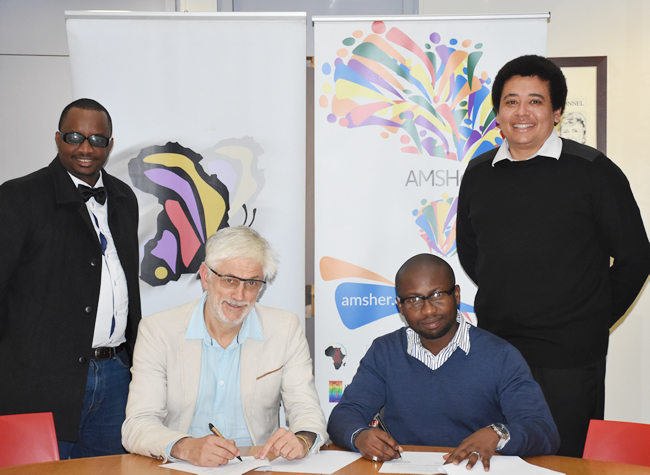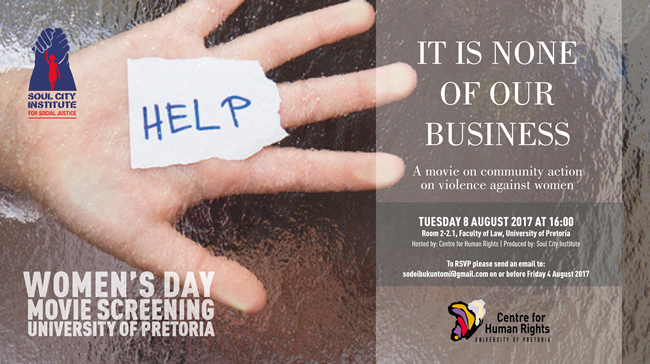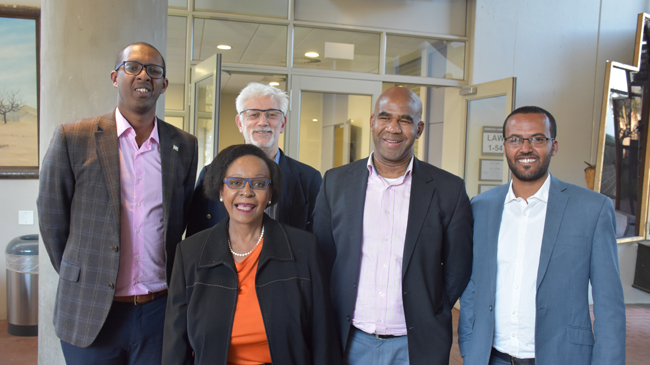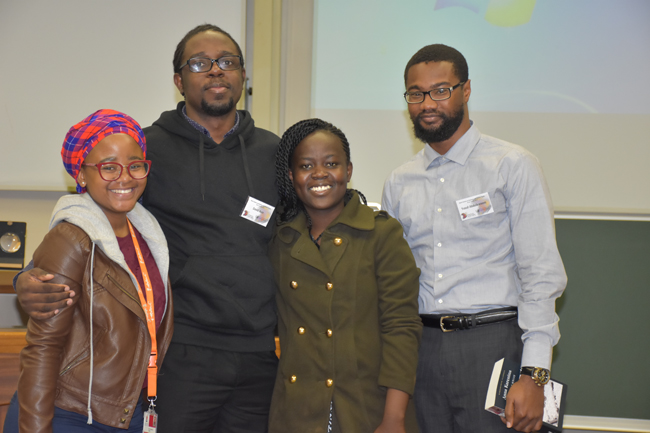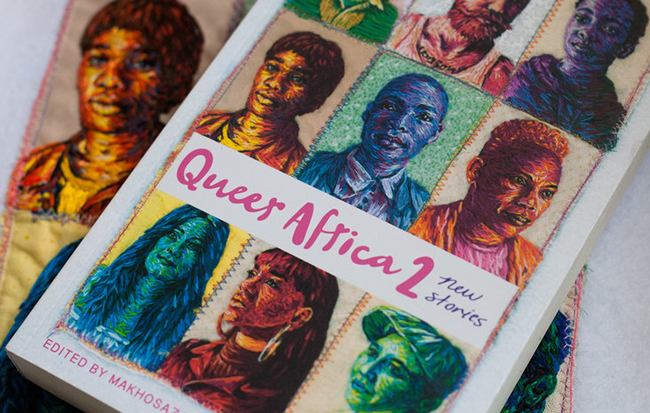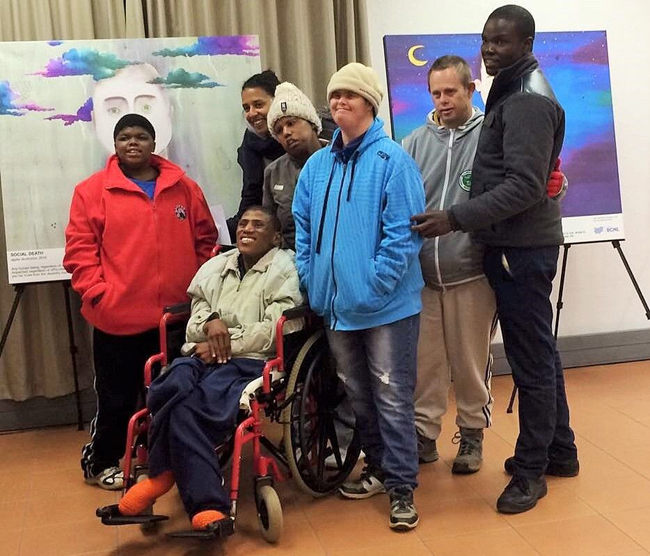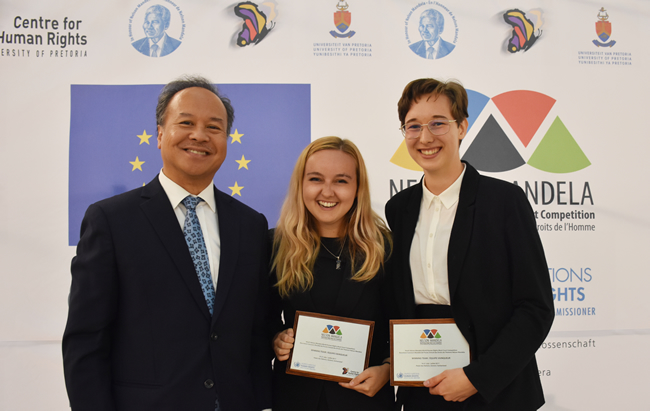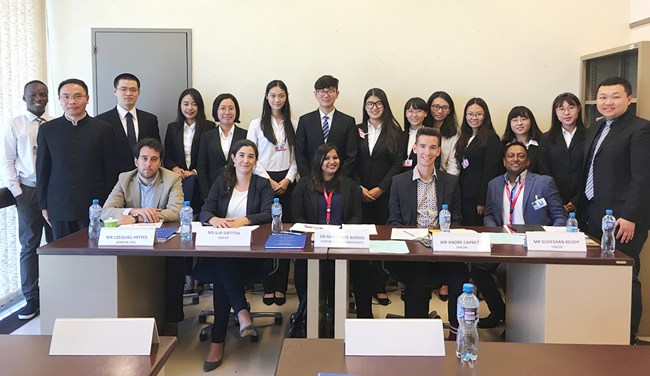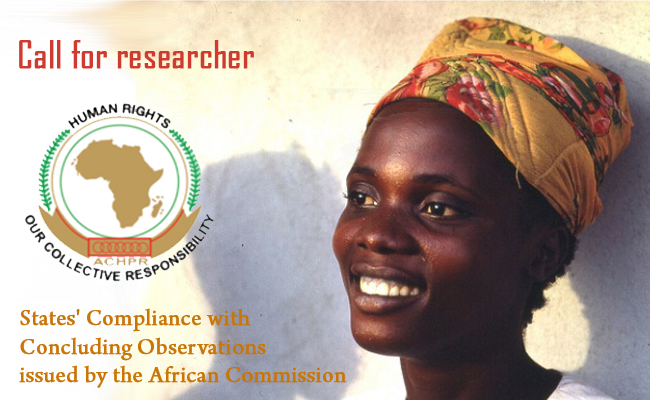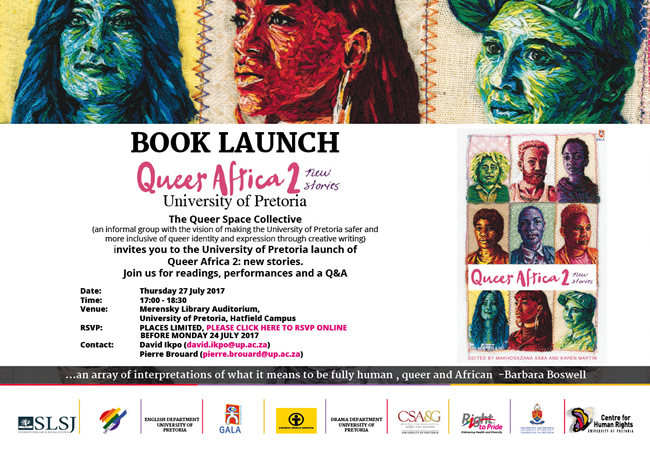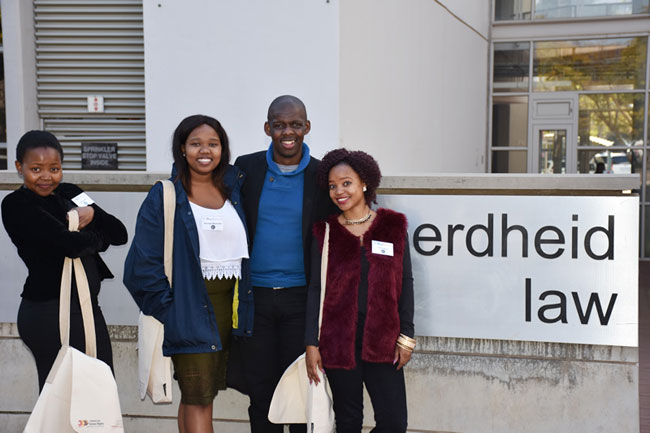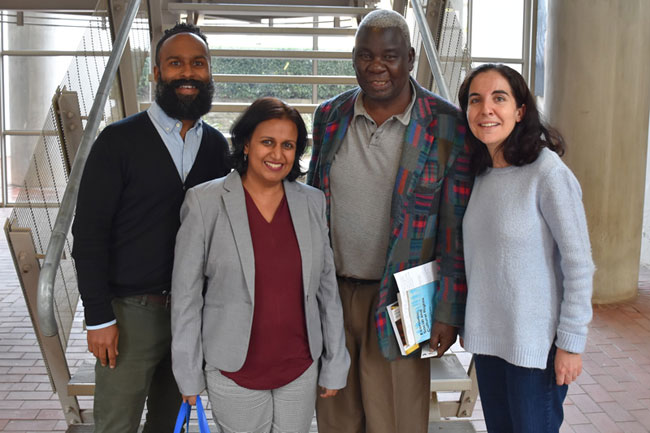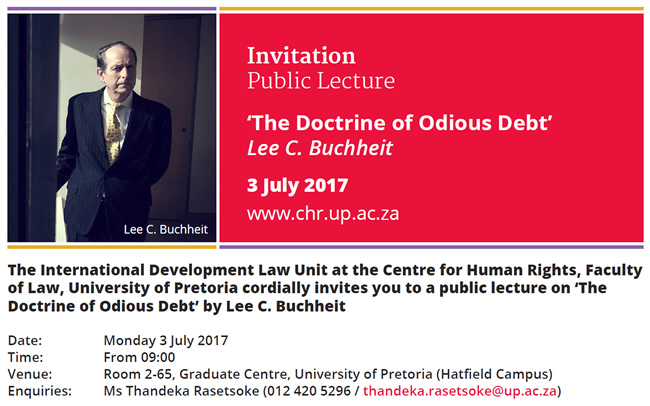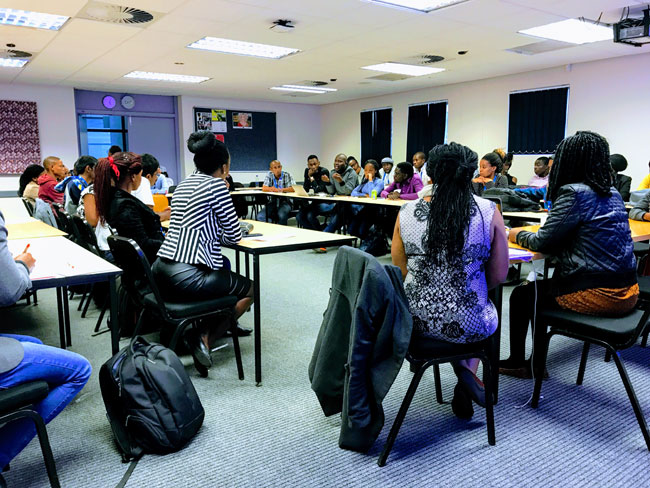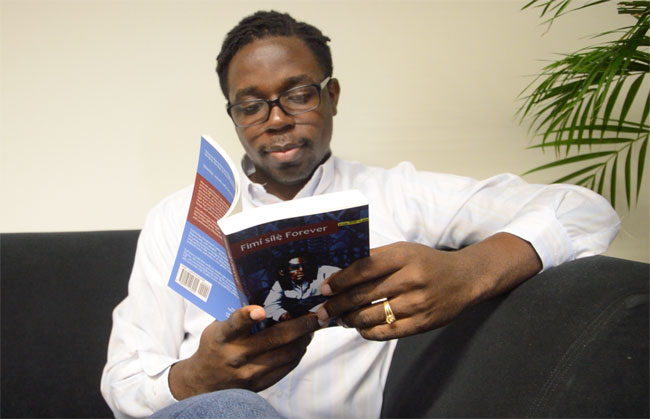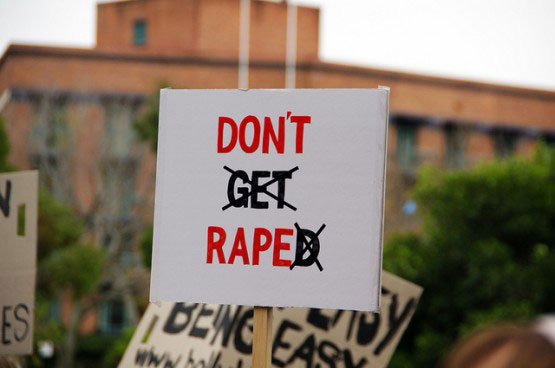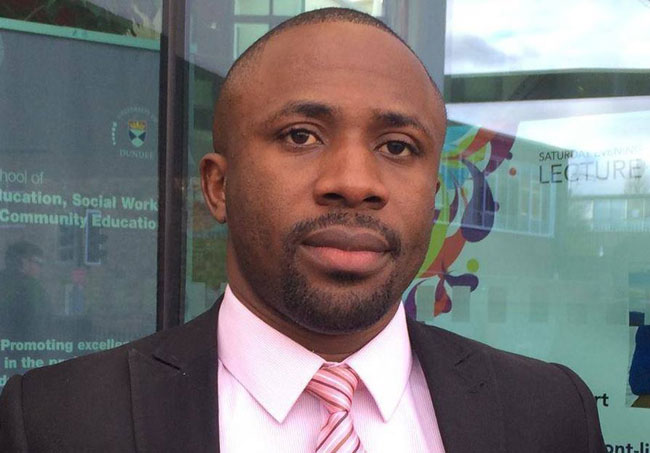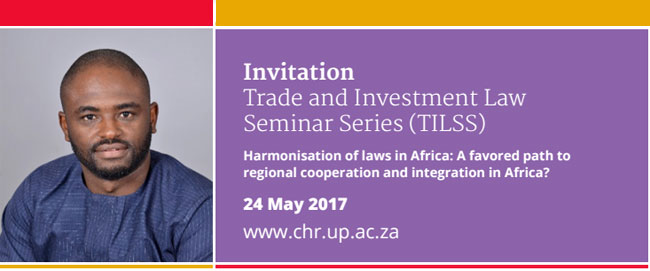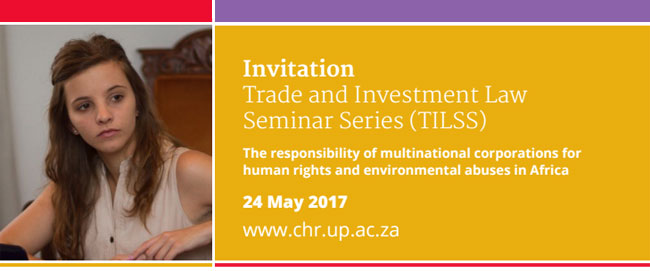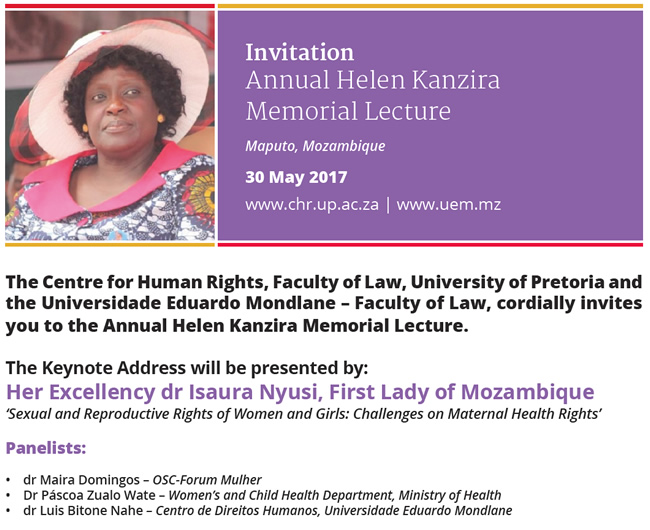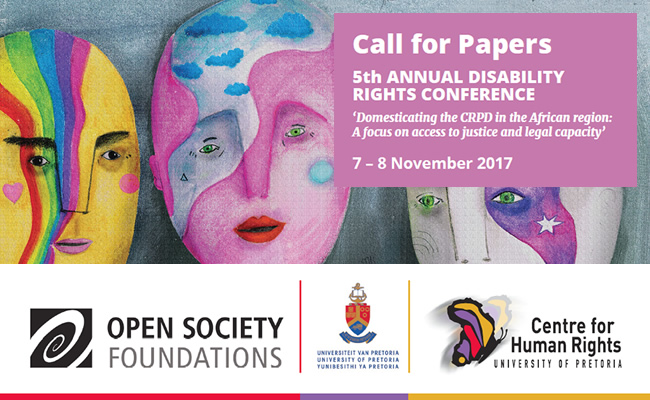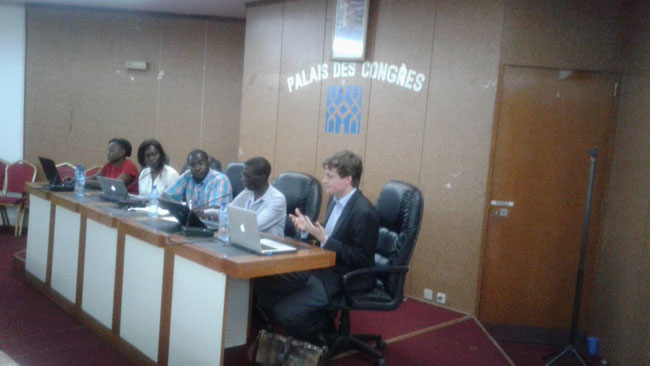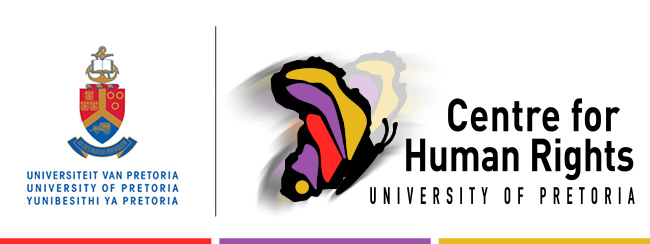- Details
The Advocacy Unit of the Centre for Human Rights has made a short film in response to the shocking slave trade of migrants recently uncovered through a CNN investigative report.
Through this video, we call on the international community to double its efforts in ensuring that the rights of migrants are protected.
- Details
TheAfrican Disability Rights Yearbook (ADRY) is calling for papers for consideration for publication in Section A of the ADRY in 2018. The ADRY publishes once a year with a focus on disability rights issues and developments of contemporary concern to persons with disabilities on the African continent. It comprises three sections – Section A containing doctrinal articles and for which we are calling for papers; Section B containing country-focused overviews of developments in disability rights in selected African countries; and Section C containing brief overviews of developments at the African regional and sub-regional levels.
- Details
More than 50 Master’s graduates
At the University of Pretoria's graduation ceremony on 8 December more than 50 students graduated with a Master's degree from the following Master's programmes organised by the Centre for Human Rights:
- LLM International Trade and Investment Law in Africa (TILA) (23 students graduating; two with distinction)
- LLM/MPhil Human Rights and Democratisation in Africa (HRDA) (organised in collaboration with 13 partner universities across the African continent; 27 students graduating, a record number of eight students with distinction)
- LLM/MPhil Multidisciplinary Human Rights (two students graduating)
- LLM/ MPhil Sexual and Reproductive Rights in Africa (one student graduating)
- Master’s by research (one student graduating)
- Details
On Friday, 8 December 2017, the Faculty of Law at the University of Pretoria commemorated the legacy and life of Oliver R. Tambo (1917 – 2017) with the unveiling of a bust of the late leader and the launch of a book written by retired Constitutional Court Justice Albie Sachs titled Oliver Tambo's dream in the OR Tambo Law Library.
- Details
Democracies are fragile. Now, more than ever, fake news, populist politicians and disenchanted voters are putting this fragility to the test. Against this backdrop, the Centre for Human Rights (Centre), Faculty of Law, University of Pretoria, on 7 December hosted a one-day international conference on the theme ‘Democracy Under Threat’.
- Details
For over 35 years since the right to development gained formal recognition as a human right, it has remained the subject of a highly politicised debate. Unfortunately, as former UN High Commissioner for Human Rights, Navi Pillay noted on the occasion of the commemoration of the 25th Anniversary of the Declaration on the Right to Development in 2011, the politicised debate ‘has done little to free the right to development from the conceptual mud and political quicksand in which it has been mired all these years’. Conceptually, the right to development entails concrete action to ensure its realisation. Following the universal recognition of the right to development in the Vienna Declaration and Programme of Action in 1993 and the undertakings under other international instruments to make its realisation a reality, it is crucial to determine to what extend these commitments have been actualised.
- Details
To set the scene for the forth-coming International Human Rights Day slated for 10 December 2017, the Centre for Human Rights in collaboration with the Embassy of the Netherlands and Village Verbals hosted ‘The body that takes pride’ a panel discussion with visual and performance art which narrowed in on the themes of the rights of women and LGBTIQ persons. The star-studded panel was comprised of the Natalia Molebatsi, Nondumiso Msimanga, Beverly Ditsie and Prof Tiffany Willoughby-Herard.
- Details
The Global Campus Human Rights Week is held from 4 to 9 December 2017 in Pretoria. The event is organised by the Global Campus of Human Rights / European Inter-University Centre for Human Rights and Democratisation (EUIC) in partnership with the Centre for Human Rights, University of Pretoria. The first even on the agenda was a seminar on African cinema and human rights. Before the seminar, the Global Camp made several presentations, introducing all the regional programmes. These presentations comprised of sub-presentations made by delegates from the 7 branches of the Global Campus of Human Rights: Arab World, Europe, South East Europe, Latin America Caribbean, Caucasus, the Asia Pacific and Africa.
- Details
The following vacancy is available: Terms of Reference
- Details
The Centre for Human Rights, University of Pretoria, in collaboration with the Global Campus of Human Rights cordially invite you to a multi-disciplinary international conference on the theme ‘Democarcy under threat’.
- Details
The Centre for Human Rights, University of Pretoria, in collaboration with the Global Campus of Human Rights, Cinema Human Rights and Advocacy, Irish Centre for Human Rights, NUI Galway and the Kingdom of the Netherlands cordially invite you to film screenings, presentations and discussions on African cinema and human rights.
- Details
The Centre for Human Rights, Faculty of Law, University of Pretoria cordially invites you to its Master’s degree graduation ceremony. This graduation ceremony is hosted annually on or around 10 December to celebrate International Human Rights Day.
- Details
(By Prof Charles Ngwena)
What seemed unimaginable has happened. After an uninterrupted ‘reign’ of 37 years, Robert Mugabe, the de facto emperor of Zimbabwe, has ‘resigned’ from office. There has been genuine jubilation not least among those who have been at the receiving end of Mugabe’s increasingly despotic, corrupt and dysfunctional governance – the majority of Zimbabweans. Emmerson Mnangagwa has taken office as Mugabe’s successor. It is a historic moment. Since attaining independence in 1980, Zimbabweans have only known Mugabe as their political supremo – initially as prime minister and latterly as president. The fact of Mugabe’s departure from office, alone, has raised hopes that we might be at the cusp of a compassionate, fairer, humane and democratic Second Republic. At the same time, the clouds are pregnant with contradictions, counselling us not to throw caution aside even as we pine for change. Why is this?
- Details
On 18 November 2005, the Southern Africa Development Community Tribunal (SADC Tribunal) was inaugurated as a judicial body established to resolve disputes between Southern African states and between states and their citizens. At that time, there were many celebrations around the inauguration of the Tribunal because a regional court with the power to hear human rights cases is a critical mechanism in the pathway to justice after exhaustion of local remedies. However, the celebrations were short-lived. In 2009, Zimbabwe challenged the legitimacy of the Tribunal stating that it had not been established according to international law norms. This led to suspension of the Tribunal by decision of SADC leaders, in 2010.
- Details
The Global Campus Human Rights Week will be held during the week from 4 to 9 December 2017 in Pretoria, South Africa. The events will feature a film screening and discussion on African cinema and human rights, meetings of institutional and governance structures of the Global Campus, a visual / performance art and panel discussion on the rights of women and LGBTIQ persons, a multi-disciplinary conference on contemporary and future challenges to democracy worldwide and the graduation of the 18th cohort of students on the Master’s degree programme in Human Rights and Democratisation in Africa. The event is organised by the Global Campus of Human Rights in partnership with the Centre for Human Rights, University of Pretoria. The conference is realised thanks to the European Union.
- Details
It has been confirmed! The 2018 African Human Rights Moot Competition will take place in Ghana, and will be co-organised by the School of Law, University of Ghana and the Centre for Human Rights, Faculty of Law, University of Pretoria.
On 14 November 2017, the University of Ghana joined a small group of African Universities that have twice hosted the African Human Rights Moot Competition, when its Vice Chancellor and the Centre’s Director signed a Memorandum of Understanding, providing that the Moot will be hosted in Accra, from 6 to 11 August 2018.
- Details
On 9 November 2017, twenty three (23) alumni of the Disability Rights Scholarship Programme met at Saint George Hotel in Pretoria following the culmination of the 5th Annual African Disability Rights Conference. The purpose of the alumni meeting was to establish and form a platform for the alumni to network, share information about the scholarship programme, prospects for academic advancement and collaborate on issues pertaining to regional and country progress on disability rights.
- Details
The importance of inclusive education has been recognised globally as critically important for the advancement of the right to education. The retention and successful throughput of students with disabilities in higher education institutions is at a critical juncture. In Africa, the transformation of higher education systems so that they provide quality inclusive education for all students is in its infancy.Students with disabilities are for the greater part still not able to equally participate in higher education institutions as their abled bodied counterparts. The Disability Rights and Law Schools Project in Africa partner universities met in Pretoria to discuss the current state of inclusion in higher education with regards to students with disabilities.
- Details
Dr Samuel Kabue, a member of the United Nations Committee on the Rights of Persons with Disabilities (CRPD Committee), welcomed the Conference’s thematic focus, which is on legal capacity. He noted that the Committee has been grappling with the concept of ‘legal capacity’, and its practical application, especially in Africa. He lamented the fact that even for states that have ratified, the implementation of the CRPD is impeded by a lack of state reporting, a failure to accept individual complaints and failure to designate national monitoring mechanisms for the realization of the rights of persons with disabilities.
- Details
A group of representatives of organizations working on the protection of persons with albinism in Africa convened in Pretoria on Monday 6 November 2017 at the call of the United Nations Independent Expert on the Enjoyment of Human Rights by Persons with Albinism, Ms. Ikpwonosa Ero. Ms. Ero’s mandate as the Independent Expert was created in 2015 by the UN Human Rights Council, to address discrimination and stop the killings of people living with albinism.
- Details
On Saturday 4 November 2017, the Centre for Human Rights (Centre) in partnership with Iranti-org and SIPD -Uganda convened a panel discussion on intersex human rights in Banjul, The Gambia. The event came on the side-lines of the 61st ordinary session of the African Commission on Human and Peoples’ Rights (African Commission) which is taking place from 1-15 November. This was monumental considering that the African Commission is celebrating its 30 years anniversary and achievements ever-since it became operational 30 years ago.
- Details
The Centre for Human Rights, Faculty of Law, University of Pretoria and UNESCO developed a massive open online course (MOOC) on the International and African Legal Framework on Freedom of Expression, Access to Information and the Safety of Journalists. The MOOC, which runs from 13 November to 18 December 2017, is hosted on the Canvas Network platform. Enrollment is free of charge and after the successful completion of all the modules, participants will receive a certificate.
- Details
Only a few days to go! Files are packed, presentations rolled out and stakeholders from all across Africa are getting ready to attend the 5th Annual African Disability Rights Conference that will be held from 7 to 8 November 2017 at the Centre for Human Rights, University of Pretoria in South Africa. The array of participants include scholars, researchers, practitioners, human rights activists, advocates for law reform, persons with disabilities, civil society groups, lawyers, policymakers, and analysts.
- Details
By ratifying the Maputo Protocol in 2004, South Africa made a commitment to improve the status and protect the rights of women and girls in the country. It also committed under Article 62 of the African Charter and Article 26 (1) of the Maputo Protocol to submit periodic reports to the African Commission every two years from the time of ratification, highlighting the steps taken to guarantee the rights of women and girls. After consideration of these reports, concluding observations and recommendations are given to State Parties to guide them on the implementation of the rights as mentioned in the treaty.
- Details
The Centre for Human Rights in collaboration with the United Nations Educational Scientific and Cultural Organisation (UNESCO) held a three-day judicial training for judges from across Africa. The training which focused on freedom of expression, access to information and the safety of journalists took place from 23 to 25 October.
In attendance were senior judges from Cameroon, Ethiopia, the Gambia, Ghana, Guinea, Nigeria, Mauritania, Mozambique, South Africa, South Sudan, Tanzania, Uganda and Zambia. There was also a judge from the Economic Community of West African States (ECOWAS) Community of Court of Justice.
- Details
The Centre for Human Rights works for the improvement of the human rights of minorities - including sexual minorities - and other disadvantaged or marginalised persons or groups across the continent.
- Details
The Centre for Human Rights (CHR), Faculty of Law, University of Pretoria, is looking for a research consultant to prepare a baseline report on the impacts of the extractive industries on human rights and the environment in Africa. This work forms part of a project in which the CHR offers support to the Working Group on Extractive Industries, Environment, and Human Rights (WGEI) of the African Commission on Human and Peoples’ Rights (African Commission).
- Details
On Wednesday 18 October 2017, the Women's Rights Unit of the Centre for Human Rights (the Centre) organised a one-day meeting with Government and civil society organizations on Malawi’s compliance with the concluding observations issued by the African Commission on Human and Peoples’ Rights (African Commission) specifically in relation to the Protocol to the African Charter on Human and Peoples Rights on the Rights of Women in Africa (Maputo Protocol). The meeting was held in collaboration with the Ministry of Justice and Constitutional Affairs in Malawi. The meeting brought together a total of about 20 stakeholders from the relevant government ministries, National Human Rights Commission, Office of the Ombudsman and Civil Society Organisations involved in the state reporting process in the country. The meeting was held at the Sunbird Capital hotel, in the capital city of Lilongwe.
- Details
The Centre for Human Rights, University of Pretoria, calls for applications for full-time doctoral scholarships in the field of sexual and/or reproductive rights and their intersection with culture or criminalisation in the African region.
- Details
We, LGBTI human rights defenders and human rights lawyers, having gathered at the Centre for Human Rights, University of Pretoria, South Africa, from 16 to 19 October 2017 for a training on Strategic Advocacy and Litigation for LGBTI Human Rights Defenders in Africa, strongly condemn the harassment, arbitrary arrest and prolonged detention of ordinary citizens perceived to be gay in Egypt and Burundi; human rights activists working with health rights organisations in Tanzania; as well as human rights lawyers planning to litigate a case on LGBTI health rights in Tanzania.
![]() Download this statement
Download this statement![]() Download Petition to the Government of Tanzania to respect, promote and protect legal practitioners and human rights defenders from all forms of threats, harassment and intimidation
Download Petition to the Government of Tanzania to respect, promote and protect legal practitioners and human rights defenders from all forms of threats, harassment and intimidation
- Details
The Disability Rights Scholarship Programme provides awards for master’s degree study to disability rights advocates, lawyers, and educators to develop new legislation, jurisprudence, policy, research, and scholarship to harness the innovations and opportunities offered by the United Nations Convention on the Rights of Persons with Disabilities (CRPD).
- Details
The Faculty of Law, University of Pretoria (UP) on 17 October 2017 entered into a Memorandum of Understanding (MoU) with the Pan-African Parliament (PAP). The foreseen collaboration will be spear-headed by the Centre for Human Rights, but may involve other departments, centres, institutes and units in the Faculty of Law.
- Details
The Centre for Human Rights, Faculty of Law, University of Pretoria, deplores any form of sexual harassment and is steadfastly committed to supporting the University community in any way possible to ensure that it is a safe environment – free from sexism, racism and other forms of discrimination – and to foster the values of equality, integrity, human dignity, privacy and mutual respect.
- Details
The first African Forum for Doctoral Research in Human Rights (AfriDoors) was held at the University of Pretoria from 9 to 13 October. AfriDoors brought together close to 50 doctoral students, post-docs and faculty from the member institutions of Strengthening Human Rights Research and Education in Sub-Saharan Africa (SHUREA). SHUREA is a project funded by the Ministry for Foreign Affairs of Finland through the Finnish National Agency for Education (EDUFI) and is aimed at strengthening policy relevant human rights research.
- Details
The Centre for Human Rights, Faculty of Law, University of Pretoria cordially invites you to a seminar on South Sudan and issues arising from narratives on human rights and armed rebellion.
- Details
The Sexual Orientation Gender Identity and Expression (SOGIE) Unit, Centre for Human Rights in collaboration with the Kingdom of the Netherlands Embassy in Pretoria is currently hosting the 2018 Training Workshop on Strategic Advocacy and Litigation for LGBTI Human Rights Defenders and Activists. This workshop, now ongoing, shall run from 16 October 2017 to 19 October 2017. In attendance are LGBTI human rights defenders from the legal, health, civil society and other sectors across the African continent. The participants are trained on using several advocacy stragies, including faith-based, disruptive and prison advocacy, as well as strategic litigation at national level, and how to use the UN and African regional human rights system for the advancement of LGBTI human rights.
- Details
SUMMARY: In 2015, the African Commission on Human and Peoples’ Rights (African Commission), based in Banjul, The Gambia, and the AU body supervising state compliance with the African Charter on Human and Peoples’ Rights, granted observer status to the NGO Coalition of African Lesbians (CAL). When the Executive Council of the African Union (AU), with its headquarters in Addis Ababa, Ethiopia, subsequently considered the Commission’s activity report, it directed the African Commission to retract the observer status granted to CAL. A potential deadlock was avoided when two NGOs (the Centre for Human Rights and CAL) submitted a request for an advisory opinion to the African Court on Human and Peoples’ Rights, soliciting the Court’s view on how the matter could be resolved. However, the Court has now declined to give its view, on the basis that the two NGOs were not competent to bring the request. This decision puts the Commission and the Executive Council on a potential collision course. The circumstances of the case revealed that the system of NGO obtaining observer status with the AU is illusory, as no NGO has as yet obtained this status.
- Details
The Centre for Human Rights, Faculty of Law, University of Pretoria (UP), takes note of the 2018 raking of law faculties or schools by the Times Higher Education World University Rankings (THEWUR), in which the University of Pretoria’s Faculty of Law is placed at position 92.
According to the THEWUR, using a fixed set of criteria, UP’s Faculty of Law is the top law faculty not only in South Africa, but in Africa. As one of six departments within the Faculty of Law, the Centre for Human Rights acknowledges and thanks our staff, current students, our many graduates, partners, donors and other supporters, for their contributions in making the Centre – and the Faculty – a centre of excellence in Africa.
- Details
Students and other interested parties are invited to attend a panel discussion on: ‘Working as a UN expert’. The Faculty of Law, University of Pretoria is currently in the unique position where three of its professors serve as expert members of United Nations bodies involved in the development of international law. They will discuss their work and how the appointment procedure works. This should be of special interest to students who consider a career with an international dimension.
- Details
A two-days Conference on the theme ‘Regional Perspectives on the Right to Development’ was jointly organised by the Centre for Human Rights, University of Pretoria and the Thabo Mbeki African Leadership Institute, University of South Africa. The Conference took place on 28 and 29 September 2017 at the University of Pretoria.
- Details
The Disability Rights Unit at the Centre for Human Rights, University of Pretoria, conducted a training course on disability mainstreaming, coordination, financing and implementation for senior government officials of the Africa Union member states and focal persons from the African Union Commission (AUC). Senior government officials from Sierra Leone, South Sudan, Somalia, Swaziland, Lesotho, Rwanda, Uganda, Nigeria and Zimbabwe attended the one-week training which took place from 18-22 September 2017 at Capital Hotel in Addis Ababa, Ethiopia.
- Details
The Centre for Human Rights, Faculty of Law, University of Pretoria, in collaboration with International Work Group for Indigenous Affairs (IWGIA) hosted its Advanced Human Rights Short Course on Indigenous Peoples’ Rights in Africa from 25-29 September, 2017. The course brought together 32 participants; from different countries across Africa and Europe, with backgrounds that include: NGO managers, delegates of indigenous communities, academia, government policy makers, civil society, independent community consultants and legal practitioners.
- Details
Mauritius ratified (with reservations) the Protocol to the African Charter on Human and Peoples’ Rights on the Rights of Women in Africa (Maputo Protocol) in June 2017. This makes 39, the countries that have ratified the Maputo Protocol. The presence of the African Human Rights Moot Court Competition in Mauritius provided an opportunity for the Women’s Rights Unit to host an all stakeholder meeting not only to celebrate this momentous step towards full realisation of women’s rights but to also reflect on the challenges that delayed ratification since signing in 2005 and lessons apparent. In addition the meeting discussed the impact of ratification of the Maputo Protocol on the lives of women and girls in Mauritius and the critical next steps post the ratification.
- Details
The African Human Rights Moot Court Competition is the largest gathering of students, academics and judges around the theme of human rights in Africa. This annual event brings together all law faculties in Africa, whose top students argue a hypothetical human rights case as if they were before the African Court on Human and Peoples’ Rights. The Competition aims to prepare a new generation of lawyers to argue cases of alleged human rights violations before the African Court.
- Details
The African Human Rights Moot Court Competition Conference took place at the University of Mauritius on 22 September 2017. Every year, the conference is one of the major highlights of the Moot Court competition. The conference utilises the platform of the Moot Court, which brings together students and faculty representatives from over 54 different universities around Africa, to raise, discuss and advance important issues of human rights in the continent. The 2017 conference theme was “The Maputo Protocol and poverty alleviation: Towards the realisation of women's rights in Africa”.
- Details
The Centre for Human Rights received a delegation from the Human Rights Commission of Sierra Leone on 22 September to explore potential collaboration. The Human Rights Commission expressed interest in support in capacity building of commissioners and staff in particular in relation to disability rights, LGBTI rights, business and human rights, women's rights and complaints handling.
- Details
The Disability Rights Unit of the Centre for Human Rights (the Centre) on 21 September 2017 had a privilege of hosting a delegation of senior government officials from the Kingdom of Lesotho (Lesotho).
- Details
The Centre for Human Rights, University of Pretoria, and Pan Africa International Lesbian, Gay, Bisexual, Transgender, and Intersex Association (Pan Africa ILGA) strongly condemn the recent arrest of parents and NGO personnel at a training workshop on HIV prevention.
- Details
The African Human Rights Moot Court Competition is the largest gathering of students, academics and judges around the theme of human rights in Africa. This annual event brings together all law faculties in Africa, whose top students argue a hypothetical human rights case as if they were before the African Court on Human and Peoples’ Rights. The Competition aims to prepare a new generation of lawyers to argue cases of alleged human rights violations before the African Court.
- Details
On 11 September 2017, the Institute of International and Comparative Law in Africa at the University of Pretoria hosted a debate between Professor Dire Tladi and Dr Thompson Chengeta on whether the Government of South Africa’s decision to grant Grace Mugabe immunity is within the confines of the law. The debate was chaired by the Director of Centre for Human Rights, Professor Frans Viljoen.
- Details
The Centre for Human Rights, Faculty of Law, University of Pretoria hosted the Advanced Human Rights Short Course on Police Oversight and Accountability in Africa from 11 to 15 September 2017. The course brought together 33 participants from several countries across Africa with backgrounds that include: national human rights institutions, police officers, academia, civil society, legal practitioners, prosecutors and government.
- Details
In celebration of the International Save North Korean Refugees Day on the 22 nd of September 2017; Defense Forum Foundation, Free North Korea Radio , Centre for Human Rights, Africa Solidarity for Sahrawi and North Korea Freedom Coalition cordially invite you to a seminar titled: Human Rights in North Korea
- Details
Terms of Reference
Invitation to the 2017 Julius Osega Memorial Lecture (to be presented by Solomon Dersso in Ethiopia)
- Details
The Centre for Human Rights, Faculty of Law, University of Pretoria and the Faculty of Law, Addis Ababa University, cordially invites you to the Annual Julius Osega Memorial Lecture.
- Details
The 26th African Human Rights Moot Court Competition is organised by the Centre for Human Rights, University of Pretoria in collaboration with the University of Mauritius from 18 to 23 September 2017 in Réduit, Mauritius.
- Details
On Wednesday 9 August to Friday 11 August 2017, the Women's Rights Unit of the Centre for Human Rights (the Centre) took part in a three-day state reporting drafting workshop on the African Charter on Human and Peoples' Rights (African Charter) hosted by the Ministry of Justice in Zambia.
- Details
The Centre for Human Rights, Faculty of Law, University of Pretoria cordially invites you to a conference on advancing the right to access to justice and legal capacity for persons with disabilities in Africa which will be presented from 7 to 8 November 2017.
- Details
In its debut edition, FACES cellphone film competition recognized the short film by Miss Jane Choolwe Nsanzya as the winning entry. In addition to winning an all expense paid trip to Mauritius, Miss Nsanzya’s film titled “Ignorance isn’t bliss” will be screened during the 26th African Human Rights Moot Court Competition, taking place in Mauritius.
- Details
The Centre for Human Rights, Faculty of Law, University of Pretoria with the support of the Embassy of the Kingdom of the Netherlands, cordially invites you to apply for the Training Workshop on Strategic Advocacy and Litigation targeted at the promotion and protection of the human rights of lesbian, gay, bisexual and transgender persons for LGBT human rights defenders and activists in Africa.
- Details
The Centre for Human Rights on 6 September had the pleasure to host a delegation from the Sri Lanka Right to Information Commission (the Commission) on Wednesday 6 September. The delegation which comprised three Commissioners, the Director General as well as the Legal and Research Officer of the Commission met with the Director of the Centre for Human Rights, Prof Frans Viljoen and the head of the Access to Information (ATI) Unit, Dr Lola Shyllon.
- Details
On 29 and 30 August 2017, the Centre for Human Rights, University of Pretoria in collaboration with the Special Rapporteur on Freedom of Expression and Access to Information in Africa of the African Commission on Human and Peoples’ Rights (ACHPR), Commissioner Pansy Tlakula, organised a meeting of the members of the Working Group on the draft ‘Guidelines on Access to Information and Elections for Africa’ (Draft Guidelines).
- Details
The Centre for Human Rights, Faculty of Law, University of Pretoria (UP), hosted its Advanced Human Rights Short Course on The Right to Development in Africa from 21-25 August, 2017. The short course brought together more than 25 participants; from 15 countries across Africa and Europe, with backgrounds that include national human rights institutions, academia, NGO managers, government policy makers, civil society, independent community consultants, legal practitioners, state attorneys and diplomats.
- Details
This week is the Anti-Discrimination week at University of Pretoria. The Queer Space Collective(QSC), through this video contributes to the conversation on what discrimination means to the queer community at the University of Pretoria, and what the university management should include among its considerations while drafting the University of Pretoria Anti-Discrimination Policy. The QSC is an informal group of persons, departments and organisations with the vision to make the University of Pretoria safer and more inclusive of queer identity through creative writing and expression.
- Details
On 24 August 2017 the Centre for Human Rights hosted yet another cohort of Young African Leaders Initiative (YALI) Southern Africa scholars for an afternoon of discussions on violence against women and the rights of sexual and gender minorities.
- Details
The Faculty of Law at the University of Pretoria cordially invites all staff and students to presentations by specialists on anti-discrimination lawto co-incide with the UP Anti-discrimination week.
- Details
The Centre for Human Rights presented a capacity-building workshop on international human rights protection mechanisms in Zambia at the Intercontinental Hotel in Lusaka, Zambia, on 16 and 17 August 2017. The workshop was organised in collaboration with the University of Zambia, and was attended by more than 40 participants. Participants included Mr Likando Kalaluka (Attorney General of Zambia), Dr. Zonke Majodina (former member/chairperson of the Human Rights Committee) as well as legal officers and staff of various government institutions and ministries. Staff from the Zambian Human Rights Commission, the National Assembly of Zambia, Zambia Open University, Law Association of Zambia (LAZ), Centre for Human Rights, civil society organisations and the press were also in attendance.
- Details
The Centre for Human Rights, University of Pretoria is among four other universities across the world working with Amnesty International on its cutting-edge volunteer project Digital Verification Corps (DVC). Coordinated by Sam Dubberley, the DVC was created to equip students to subsequently support the work of Amnesty International’s researchers, who are often confronted with overwhelming volumes of unverified social media content in connection with some form of human rights abuse.
- Details
The Centre for Human Rights, Faculty of Law, University of Pretoria, through its Sexual Orientation, Gender Identity and Expression (SOGIE) Unit, applauds last week’s judgment by the High Court of South Africa Gauteng Local Division in Johannesburg, sitting as an equality court, in the matter of the South African Human Rights Commission v Jon Qwelane. The Court found that Qwelane’s derogatory comments about gays, published in 2008, constituted hate speech, and ordered him, within 30 days, to apologise unconditionally to the lesbian, gay and bisexual community.
- Details
The Centre for Human Rights, Faculty of Law, University of Pretoria, is currently presenting its Advanced Human Rights Course on The Right to Development in Africa, from 21 to 25 August 2017. The course is aimed at responding to the eternal question: ‘is development a human right’? What does it mean in the African context?
As part of the short course, the Centre hosted the Flemish Delegation to Southern Africa. The delegation was led by the Flemish Minister-President Hon Geert Bourgeois and Dr Geraldine Reymenants, General Representative of the Government of Flanders. Also present were representatives from the University of Pretoria: Prof Tiniyiko Maluleke (Special Advisor to the Vice-Chancellor of the University of Pretoria), Prof Andre Boraine (Dean, Faculty of Law, University of Pretoria) and Mr Norman Taku (Assistant Director, Centre for Human Rights).
![]() Download this statement
Download this statement ![]() Download the lecture by Hon Minister-President Geert Bourgeois
Download the lecture by Hon Minister-President Geert Bourgeois
- Details
- Details
The University of Pretoria is currently in the unique position where three law professors from the faculty of law serve as international experts on key UN bodies in Geneva, responsible for the development and application of international law.
According to the dean of the faculty of law, Professor Andre Boraine, such a concentration of international experts in one university is exceptional by any standard.
“Some – not even all – countries count themselves lucky if they have one person in these key UN positions: here we have three experts not only from one country but also from one university,” he said.
- Details
- Details
The Centre for Human Rights made a presentation before members of the Pan African Parliament Permanent Committte on Justice and Human Rights on the continued plight of persons with albinism on the continent and the need for regional action on 9 August 2017. The presentation is part of the Centre for Human Rights’ on-going efforts to advance the rights of persons with albinism in Africa which began in 2016. The presentation, which took place at the Pan African Parliament headquarters in Midrand, South Africa during the Justice and Human Rights Committee session sought to bring to the attention of the Committee members the continued persistent and egregious violations of the rights of persons with albinism. More importantly the need for African states to adopt the recently finalised Regional Action Plan on Albinism in Africa, a 5-year plan to address attacks and related violations against persons with albinism in Sub Saharan Africa.
- Details
Every year on 9 August, South Africa celebrates National Women’s Day in recognition of the role that women played in the liberation of the country from Apartheid. On 9 August 1956, over 20,000 women marched onto the Union Buildings in Pretoria protesting the Pass-Laws that restricted the movement of women of color in white areas to certain times of the day. The demonstration was a resounding success and is nationally recognised as one of the political milestones that marked the events that challenged the apartheid government to eventually usher in democracy in 1994. While National Women’s Day celebrates the courage of those women back in the day, it has also evolved into a day to promote women’s rights within the community and to call out government to act on unfulfilled promises to women in the country regarding rights such as freedom from violence perpetrated against women and girls.
- Details
The Centre for Human Rights held a capacity building workshop for members of the Pan African Parliament (PAP) on 5 August 2017. The workshop, which was held at the seat of PAP in Midrand, South Africa, was themed ‘Digital Rights, Democracy and Governance in Africa: The Role of National and Regional Parliaments. The Centre for Human Rights facilitated this workshop in collaboration with its partners- Applied Law and Technology (ALT) Africa, Association for Progressive Communications (APC) and Google.
- Details
The Centre for Human Rights, Faculty of Law, University of Pretoria, takes note of media reports and images circulating on social media, suggesting that the Deputy Minister of Higher Education, Mduduzi Manana, has been involved in a case of assaulting a woman in a public place (restaurant) over the weekend.
- Details
The Centre for Human Rights calls for the immediate release of the 42 persons who were unjustly arrested by law enforcement agents at the HIV awareness training for sexual and gender minorities which was held at the Vincent Hotel, Weigh Bridge in Owode Onirin, Lagos State, Nigeria on Saturday 29 July 2017.![]() Download this statement
Download this statement
- Details
On 2 August 2017, the Centre for Human Rights signed a technical cooperation agreement with African Men for Sexual Health and Rights (AMSHeR), establishing a framework for concrete collaboration on a number of activities. AMSHeR is a Pan-African coalition of organisations focusing on men who have sex with men (MSM) and lesbian, gay, bisexual and transgender persons (LGBT). AMSHeR works towards the promotion of non-discrimination, particularly based on sexual orientation and gender identity and the advancement of health services for MSM/LGBT persons in Africa. The signing ceremony was attended by AMSHeR’s Executive Director Kene Esom and law and human rights advocacy manager, Berry Didier Nibogora. The Centre was represented by its Director, Professor Frans Viljoen and Assistant Director Norman Taku.
- Details
The Women's Rights Unit, the SOGIE Unit and the Disability Rights Unit at the Centre for Human Rights is organising an advocacy event in commemoration of the National Women's day in South Africa. On the 9th of August 1956 more than 20 000 women of all races marched to the Union Buildings in Protest to amendments to the Pass Law and presented a petition against the idea of women carrying passes in urban areas.
- Details
The Centre for Human Rights, Faculty of Law, University of Pretoria, is currently hosting its third Advanced Human Rights Short Course on Children’s Rights in Africa. It started on Monday 31 July 2017 and runs to Friday 4 August 2017. The short course brings together 35 participants from 10 countries across Africa, with backgrounds that include national human rights institutions, academia, civil society, legal practitioners, prosecutors, teachers, medical professionals and government.
- Details
The Centre for Human Rights, University of Pretoria, hosted its second short course on business and human rights at the University of Pretoria from 10 - 14 July 2017. The event was made possible with support from the United Nations Office of the High Commissioner for Human Rights, Regional Office for Southern Africa. The short course brought together more than 55 participants, from 18 countries across Africa, with backgrounds that include national human rights institutions, academia, civil society, legal practitioners and government.
- Details
On Thursday 27 July 2017, Queer Africa 2: New stories made its grand entry into the University of Pretoria(UP) community at its well-attended book launch organised by the Queer Space Collective (QSC) at the Library Auditorium, University of Pretoria, Hatfield Campus. This was preceding earlier launches at the University of Witwatersrand, Cape Town and Oslo.
The force behind bringing Queer Africa 2: New stories home to UP, was the QSC’s vision to make the UP safer and more inclusive of queer identity and expression through creative writing and expressions. The QSC is an informal group comprising of individuals mostly from ten organisations representative of both themselves and their organisations. These organisations include: Student for Law and Social Justice; Up and Out; English Department and Drama Department of the University of Pretoria; Church World Services; Right to Care; Gay and Lesbian Memory in Action(GALA); Centre for Sexuality Aids and Gender; and the Centre for Human Rights. These organisations among other things engage actively at the core of their work with the issues of queerness and sexual and gender minority issues. Interestingly, individual membership of the QSC cuts across persons of various ages, races, sexual orientation, gender identities, nationalities and backgrounds working together through interdependence amongst members and member organisations to storm UP, to charm the UP space with the saturating consciousness of the need for equality, safety and inclusivity. The launch of Queer Africa 2: new stories is the Queer Space Collective’s maiden event.
- Details
The SA Federation for Mental Health (SAFMH) hosted the I Decide=I Am travelling art exhibition from the 17th to the 27th of July 2017 at its Randburg offices in Gauteng. The globally acclaimed exhibition by Bulgarian illustrator Nadezhda Georgieva and human rights activist Yana Buhrer tells the personal stories and reflections of sixteen people denied of their legal capacity because of their psychosocial or intellectual disability. The exhibition also includes three pieces by South African artist Daniel Mosako, based on his interpretation of the Life Esidimeni tragedy in which almost 100 persons with mental disabilities lost their lives.
- Details
The 9th Nelson Mandela World Human Rights Moot Court Competition concluded with the final round on 21 July 2017 at the Palais des Nations in geneva, Switzerland.
- The winning team of the 9th Nelson Mandela World Human Rights Moot Court Competition is the team that argued the case for the Applicant / Respondent, with 79.5%
The winning team from St Thomas University, Canada was represented by Abbie LeBlanc and Navy Vezina.
- The runner-up team of the 9th Nelson Mandela World Human Rights Moot Court Competition is the team that argued the case for the Applicant / Respondent, with 77.67 %.
The runner-up team from University of buenos Aires, Argenitina was represented by Carolina Lisandro Elias and Tomas Maria Ainchill.
- Details
The 9th Nelson Mandela World Human Rights Moot Court Competition is currently underway at the Palais des Nations, United Nations Geneva headquarters. After the submission of written memorials, 36 teams from 23 countries coming from the 5 United Nations regions progressed to the pre-final rounds that are held annually in the human rights capital of the world.
- Details
The following vacancies are available:
Terms of Reference
Project Title: State Parties' Compliance with the Concluding Observations and Recommendations issued by the African Commission on Human and Peoples Rights (ACHPR) on the Rights Enshrined in the Maputo Protocol
Organisation: The Centre for Human Right (CHR)
Job Title: Researcher
Duty Station: South Africa, Malawi, Nigeria (One position available per country)
Duration: Varied (Research paper based)
Contract Type: Individual consultant
Closing date: 31 July, 2017
- Details
The Queer Space Collective (an informal group with the vision of making the University of Pretoria safer and more inclusive of queer identity and expression through creative writing) invites you to the University of Pretoria launch of Queer Africa 2: New Stories. Join us for readings, performances and a Q&A session.
Queer Africa 2: New Stories is a ground breaking collection featuring twenty-six masterpieces from eight countries – Kenya, Nigeria, Rwanda, Sierra Leone, Somalia, South Africa, Uganda, and the United States of America. The plots of all twenty-six stories are separately and skilfully woven to reflect a vast range of human emotions and experiences that abound in the lives of Africans of all shades and colour at home and abroad who own the queer identity.
Date: Thursday 27 July 2017
Time: 17:00 - 18:30
Venue: Merensky Library Auditorium, University of Pretoria, Hatfield Campus
RSVP: PLACES LIMITED, PLEASE CLICK HERE TO RSVP ONLINE BEFORE MONDAY 24 JULY 2017
Contact: Mr David Ikpo ( david.ikpo@up.ac.za) / Pierre Brouard ( pierre.brouard@up.ac.za)
- Details
On 6 July 2017, the Centre for Human Rights hosted 5 beneficiaries and graduates (Jafta Bonginkosi, Shadrack Munyai, Xolilie Myeni, Miranda Mbonambi and Lisebo Kotelo) of the JB Marks Educational Trust Fund at the Faculty of Law, University of Pretoria.
- Details
Although the right to form civil society organisations and peaceful assembly and association are recognised by international legal instruments; civil society groups and activists continue to face threats and fall victim to oppression every day. The Centre for Human Rights, University of Pretoria hosted a three day intensive short course on Civil Society Law in Africa from 3-5 July 2017. The course brought together several participants from across Africa, mainly representing civil society groups, policy makers, government officials, national human rights institutions and academia.
- Details
The International Development Law Unit at the Centre for Human Rights, Faculty of Law, University of Pretoria cordially invites you to a public lecture on ‘The Doctrine of Odious Debt’ by Lee C. Buchheit
- Details
On Thursday, 22nd June, the Women’s rights unit and the Sexual Orientation and Gender Identity and Expression Unit (SOGIE) hosted YALI delegates at the Centre for Human Rights. This very memorable visit is part of a bi-annual collaboration between the Centre for Human Rights and the YALI Regional Leadership Center as led by the University of South Africa (UNISA). YALI aims to develop young African leaders in Business and Entrepreneurship Development; Civic Leadership; Public Management and Governance through a hybrid of innovative and complimentary learning approaches. The Centre lends its support in ensuring that the different groups of leaders are conversant in crucial human rights issues and are also aware of their responsibility as leaders to uphold these rights.
- Details
The HRDA Chronicles is out with a new episode. This time, the spotlight is on David Nnanna Ikpo, a 2016 graduate of the LLM/MPHIL in Human Rights and Democratisation in Africa. In this feature, you will get to discover how David is trying to make the world better with the stroke of his pen and through his recently published novel - Fimi Sile Forever
- Details
The Centre for Human Rights calls for urgent action to be taken by the University of Pretoria to engender a campus culture of non-violence and non-discrimination through the accelerated review of the University’s sexual harassment policy and the provision of comprehensive and accessible services for survivors of sexual violence. The University must also ensure that perpetrators of sexual violence and slanderous remarks that defame women are condemned and are held accountable for their actions.
- Details
The Centre for Human Rights congratulates Mr. Rashid Dumbuya – a graduate of its Masters Programme in Human Rights and Democratisation in Africa (class of 2013), upon his recent appointment as Commissioner of the Human Rights Commission of Sierra Leone.
Invitation: Trade and Investment Law Seminar Series (TILSS) - Speaker: Professor Babatunde Fagbayibo
- Details
The International Development Law Unit at the Centre for Human Rights, Faculty of Law, University of Pretoria cordially invites you to a seminar series titled “Trade & Investment Law Seminar Series (TILSS)”
- Details
The International Development Law Unit at the Centre for Human Rights, Faculty of Law, University of Pretoria cordially invites you to a seminar series titled “Trade & Investment Law Seminar Series (TILSS)”
- Details
The Centre for Human Rights, Faculty of Law, University of Pretoria and the Universidade Eduardo Mondlane – Faculty of Law, cordially invites you to the Annual Helen Kanzira Memorial Lecture.
The Keynote Address will be presented by: Her Excellency dr Isaura Nyusi, First Lady of Mozambique on ‘Sexual and Reproductive Rights of Women and Girls: Challenges on Maternal Health Rights’
- Details
The 5th Annual African Disability Rights Conference will be held from the 7th to the 8th of November 2017 at the Centre for Human Rights, University of Pretoria in South Africa. This year’s conference will focus on the following themes:
- a) the implications of the Convention on the Rights of Persons with Disabilities (CRPD) for the African region with particular reference to article 13, the right to access to justice and article 12, the right to equal recognition before the law;
- b) the development of mechanisms/strategies for the effective domestication and implementation of articles 12 and 13 of the CRPD and
- c) the interplay between article 13 and article 12 of the CRPD.
It is anticipated that papers presented at this conference will be reworked by authors and submitted for consideration for publication in the 2018 volume of the African Disability Rights Yearbook.
- Details
Madame Chair, Honourable Commissioners, the Centre for Human Rights welcomes the ongoing work of the Working Group on the Death Penalty and Extrajudicial, Summary or Arbitrary Killings in Africa to continue placing questions concerning the right to life, the supreme human right, high on the agenda of the African Commission.
- Details
The Centre for Human Rights earlier this year went though the process of recruiting a new Director, after the current Director's second term in that position had come to an end. However, the University’s selection committee did not shortlist any of the applicants.
The University Management subsequently decided that the University would fund a permanent position in the Centre of an Assistant Director, if the incumbent Director agrees to serve for another term. The Director (Frans Viljoen) happily agreed, and is looking forward to contribute further to advance the Centre’s vision.
We are now embarking on a process of recruiting a suitable person for the permanent full-time position of Assistant Director in the Centre.
This new position will be in addition to that of the current position of Assistant Director, which is funded by the Centre from external funds (held by Norman Taku). These developments reflect the Centre's thematic and institutional growth over thirty years.

